#and a narrative takes as long as it takes
Text
What Are The Lies You Tell Yourself?
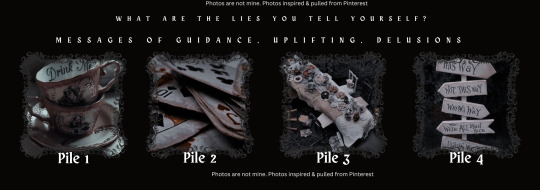
Hi, Hexlings!
This pick-a-card reading is about the many things you tell yourself to keep yourself small, stay in toxic relationships, make yourself feel bad, etc. Maybe even words of kindness to help dispel those lies.
This is a general reading, remember to take what resonates and leave what does not. This reading does not supplement your need to seek professional help. Tarot should be used as entertainment and not a for sure answer to your problems but as a guide, a sense of hope, and amusement.
Take your time when choosing your pile. Ask yourself the question and choose the picture that you can’t stop looking at. Listen to your intuition.
MasterList
Patreon Link
Ko-Fi Donations
Next Reading: Patreon (unless spirit says otherwise)

Pile l:
What are the lies you tell yourself? Tarot: 4 Swords (reversed), 2 of Swords, Awakening, 9 of Wands, 7 of Swords (reversed)
Pile l you have two different messages so I will start off with the first message of those who like to self-sabotage their lives. You like to feed yourself the narrative that you are too busy and everything is hard because you are afraid of failure. You are afraid of the things that can come from actually doing the many things that you say you want and will do. This might be success, failure, or fear of losing those around you because you aren't sure if leveling up will cause a rift or if people will start asking for money but either way, you refuse to look at yourself with complete honesty and accountability when it comes to achieving your goals because you are always feeding yourself lies as to why you can't do them out of fear of the unknown and it's time you stop lying to yourself. This doesn't even have to be a fear of failure or success, etc this could just be you feeding into your imposter syndrome or for some of you feeding into your Lana Del Rey era where you fear if you aren't sad, stressed, or anxious you won't be loved, be a funny person anymore, whatever the reasoning is. You have to give yourself a chance to fly or else you will never know what you are truly capable of or even know if you can really fly.
The 2nd message is for those who identify with hyper-independence. You refuse to acknowledge the fact that the reason you do everything yourself is because you fear having the few people around you let you down like others have. So you continue to feed this narrative of "I like to do things myself." "I'm the only one who can do things right around here." While some of it may be true...you really deep down fear people letting you down again. You are prolonging the inevitable of letting people show you who they really are. Let others around you help you so you can have a break now and then, stop always trying to carry the weight of the world on your shoulders. If someone messes up or doesn't come through...so be it. You can't control everything in your life...you are going to have to release some of that control and go with the flow and allow things to come and go no matter how lonely or horrible the feeling may feel. Better will come when you stop trying to control everything.
Extra Messages: Tea Trea Oracle Deck: June, Slowly but surely getting ahead, dissatisfaction with life, An exciting life, waiting for news/ package/ or letter, Do not back down from the opposition show strength and fortitude, solid foundation success with effort, feeling tied down or frustrated.

Pile ll:
What are the lies you tell yourself? Tarot: 7 of Cups, The Star, Page of Cups, 8 of Swords, Queen of Pentacles.
Similar to how pile l has two messages so does this pile. The first message I would like to ask is who hurt you? Who hurt you enough to where it made you believe that you can't be loved, shouldn't be loved, nor seek love. You continuously keep yourself in a small corner...my own little corner from the Cinderella movie featuring Brandi is playing in my head (Link to Song). Long story short you feel small when you are around others like you have to change who you are in order to be and feel loved but when you are alone you are exactly who you want to be if not exactly who you want to be at least you have an idea or a sense that who you are currently is not who you want to be and it's sad love. I want to hug you and let you know that you should be around others who see you, for you. You are not hard to love and you deserve the best and purest love there is. Stop feeding into the narrative of others as your own, because it's not.
The second message is similar to the first message and a little bit of the first message of pile l. You like to tell yourself reasons why you don't deserve nice things or feed into the mindset that you will never amount to financial abundance. I feel some of this mindset has to deal with childhood/adolescent trauma others of you this may have developed because you kept feeling like every time you got a leg up life would knock you down a peg as to tell you, you aren't meant to have good things when in reality life was trying to redirect you or point you in a direction of something better. You were meant to shine and have many options of abundance in your life. This message is for a few of you but this also has to deal with your looks. You possibly feel that your looks are not up to par and that everyone you meet is always better looking than you. You may also have a fear that if you ever did decide to date that the person you are with would leave you for someone better looking or "better" in general.
Extra Messages: Tea Trea Oracle Deck: A path with money is waiting for you to find it, Getting together with friends, Take care or there will be a loss of material wealth, Opportunity of windfall, Stepping into a new experience, Work/success/achievement, Affairs with your family.

Pile lll:
What are the lies you tell yourself? Tarot: 5 of Wands, Justice, 6 of Cups, 10 of Wands
This doesn't feel like a lie per se that you tell yourself like the other piles but more so of the delusion you feed yourself. This feels more of a victim mentality mixed in with entitlement and before you say nope not me....*David Beckham's voice* Be Honest. How do you feel when you aren't getting your way or dealing with small inconveniences. Be Honest. If the answer is you complain about life not being fair and you go into victim mentality mode that everything always happens to you and not for you or you just feel for whatever delusional reason that life must always cater to you without any kind of effort is....quite bold...I will applaud you for that love. You have the confidence of a mediocre white man, haha. I love to see it. This per se again isn't all that bad but it kind of is as it stems from your childhood of you parents always handing you gold stars for just existing or putting in "at least they did it" energy. You like to believe that you are doing hard work or you are doing a lot when really you self-sabotage or you do one little thing and expect life or others to bend towards your will because you "tried". This message doesn't even feel like a message to help guide you but more so to act as a mirror because it has been a while since you have been completely honest with yourself and your behavior. Some of you might be sick of yourselves and need this while others of you don't smell your own shit.
Extra Messages: None. You don't really need extra messages as your reading was all the message that you needed for a shift and clarity on how things are. Stop lying to yourself. Look in the mirror and ask if you really love what you see? If you really love the kind of person you are? If you really love how you move in your life towards things you want.

Pile lV:
What are the lies you tell yourself? Tarot: The Tower, The Empress, The Sun, Queen of Cups
Three major arcana cards and one minor arcana say a lot about you, pile lV. At first because of the type of reading this is I thought maybe you might be afraid or lying to yourself about becoming successful or experiencing happiness but as I drew clarifiers for your pile it started to come together that you are not being authentic to who you are in your feminine energy. What I mean is that you are people-pleasing way too much to the point where when you want to say no, you say yes instead. This pile gives me the vibes that when a guy approaches you, you are on your "best lady-like behavior when politely declining the guy." Even when he keeps persisting and etc you refuse to act out of character and say listen my guy back the fuck up and fuck off. Take a hint. You can be in your feminine energy and still maintain boundaries, and say what you want to say without coming off as "hard, rough around the edges, etc. There was a YouTube short the other day that was from the Clock app where someone was making fun while also having a point when it comes to people pleasers. "Oh, you're such a people pleaser...how many people have you pleased?" So many people have stitched it not being able to answer this question because who have you pleased? Do you consider yourself a dog pleasing its owner for treats, shelter, and so forth. For some of you, this all stems from childhood because maybe you grew up in a transactional household where your parents or family didn't do anything for you without expecting something in return, or even romantic and friendships have done this. It's okay to say no from time to time. It's okay to not be this prime and prissy-like persona. Again you can be loving and kind while still painting boundaries and saying no to things you don't want to do.
Extra Messages: None like pile lll, you don't really need any extra messages as your message has everything that you need to hear.
Thank you for liking and reblogging my readings. I always appreciate you guys on here and on Patreon.
Stay safe and be blessed
Next Reading: Patreon (Unless spirit says otherwise)
#spirituality#tarot reading#tarotblr#tarotcommunity#pick a card#tarot cards#pac tarot#pick a pile#pac reading#pick an image#pick a picture#pick a photo#witchblr
152 notes
·
View notes
Text
the sun sets in the east | daemon targaryen
Description: Daemon Targaryen didn't die during the war - though there were many nights that he wished he did. A prequel and sequel of the sun rises in the west, in which Daemon tries to navigate his relationship with his only son and the new life he is bestowed.
Pairing: daemon targaryen/dayne!reader (you haunt the narrative)
Rating: General Audience (grief processing, daemon being a grey character.)
Author's Note: Daenerys-Drogo inspired.
"When the sun rises in the west and sets in the east. When mountains blow in the wind like leaves. Then you shall return to me."
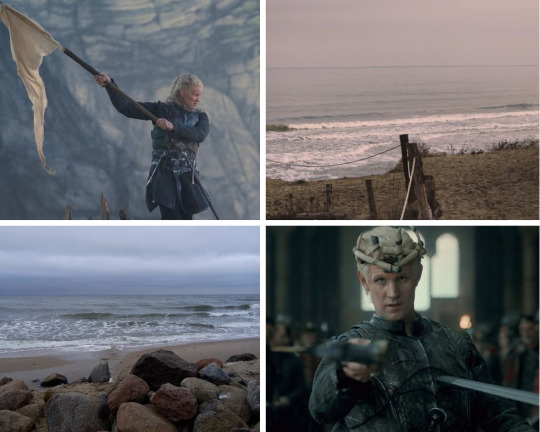

There was no milk of poppy that could subside the ache in his heart. He marched to the Stepstones with nothing to lose, he came home losing everything. "I offer my condolences, brother." Viserys places a hand on Daemon's shoulder.
Daemon watches his son from afar.
Maekar looked exactly like him, the same aquiline nose, the same purple eyes. He almost wishes that there were other children, perhaps a daughter with the same eyes as yours. He stares off to the vast horizon, the gardens in his periphery.
"When Aemma died, I was a shell of myself. Unable to rule or eat." Viserys conversed. There were no scrolls that explained how to cope the death of a wife that one loved very much.
"- and you found comfort with the Lady Alicent." Daemon interrupted, bitterness in his tone. "If you are suggesting that I find the same comforts in another one's arms. I decline." he gave his brother a tight-lipped smile.
He's spent his entire life looking for Viserys' love. He's long understood that he'll never find it, and that he'll never be his brother's first choice. Daemon waves at his son. Maekar runs towards him.
"We'll be going, your grace." he lifted his son off the ground. Disappearing from the Red-Keep. Gods know when he'll return.

He met another woman after you. After the harsh pushing of his brother to take another wife, he decided to settle with Lady Laena. She was the same as you - the same fire flowed through her veins. She wanted to be a warrior and was skilled with a dagger. She knew her place. She knew how to obey, and behind those purple eyes of hers - he finds a glimpse of you.
Maekar, who was five, placed a tender hand on Lady Laena's belly. "It will a brother." he surmised with childish curiosity. Daemon watched coldly as his second wife took kindly to his son. He wanted to rip Maekar away from Lady Laena - wanted to tell him that the woman wasn't his mother - wanted to tell him to never forget you.
Alas, he couldn't.
He couldn't bring himself to even mention your name.
"How can you be so sure, my prince?" Daemon sat beside them on the bed, placing a kiss on Maekar's forehead. "I-I wish it is." the boy played with the edges of the blanket. "- then I'll have someone to play with - like muña promised." he stuttered.
Daemon's heart sinked to his chest.
Laena smiled.
"You'll have a lot of siblings, I promise." now it was Laena's turn to place a kiss on Maekar's forehead. Daemon clenched his fists.
It was his fault. He did not speak of you - how else was Maekar supposed to know? He'll have to make things right.

"Where are we going, kepa?" Maekar inquired as his father led him to the heart of the Red Keep. "Laena is not your muña. You know that, right?" the man opened the conversation. His son replies with a hum.
Maekar wobbles in an attempt to catch up with his father. His eyes twinkling with adoration and love. "Uhuh my real muña died in the war." the son replied, and they both halted in front of a chamber. It was Daemon's old chamber.
A layer of dust gathered on the doorknob. He could not find himself to visit. "But you cannot remember muña. You were a babe when she died." he twisted the doorknob - opening the door wide. Maekar's eyes travelled along the walls, soaking in the interior of the room.
He remembers this room!
The bed was unmade - the hairbrush still had a strand of your hair. Is a piece of hair still a part of your head even when it has fallen on the floor? Are ghosts still a part of your family even when they're dead?
He reaches for his father's hand.
"Please tell me!" he beamed, and Daemon sat on the bed. Dust jumping around at the sudden shift of weight. Maekar coughs.
The older man points at the portrait on the wall. "I met your mother when I was much younger. She was seven and ten, a Dornishwoman. She made it very clear that she didn't want to lose her liberties by being married to me." he chuckled, the pain in his chest lifted by memories of you. "Liberties?" Maekar tilted his head.
"Freedom. She didn't want to lose herself. She wanted to remain a warrior, to train in the fields regardless of the court's opinion. The court had a lot to say, my son, but she did not care. She never cared about anything beyond us three." the smile never left his face.
"Remember what I told you about being a prince." he stared deep into Maekar's eyes and the little boy nodded. "When forced to choose between the kingdom and your family - always choose the kingdom, because your duty is to the people before yourself." the little boy recited, stuttering and messing up the end sentence.
"Your mother was as valiant as any prince. She wanted to choose you, my son - but we weren't the only ones suffering. Sons were marching off to war, and they never returned. She couldn't help but think about you - about our safety. The War in the Stepstones threatened the very peace of our Kingdom, and she protected that." the smile left his mouth, back to the bitter reality.
"Promise me that you'll always love your mother. Do not find fault in what she could not do." Daemon wrapped Maekar in his arms, placing him in a tender embrace.
"I always love her, kepa." he promised.

Maekar was ten and six when Daemon married Princess Rhaenyra. By then, Laena was long dead - cold to the touch as you.
Princess Rhaenyra was different, mayhaps the only woman after you that Daemon truly loved. She was filled with fire and he worshipped her - they were built in the same fire. He was devoted to her, the same way that he felt devoted to Viserys.
It was a different type of love - devotion, but not love itself.
"Hold him, husband." Rhaenyra smiled, sweat gathering at her forehead. Daemon smiled in return, reaching for Aegon.
His second son, the namesake of his ruined brother. "- he looks like you." she added, licking her lips.
"I was scared, I thought that I'll lose you both." he confessed. Rhaenyra reached for his face. "You'll never lose me." she promised, just before their lips could be bridged together - a handmaiden opens the door.
"My prince, my princess. Lady Melara has given birth to a son." the handmaiden announced. Rhaenyra's face sunk to the floor.
Maekar has stolen her thunder, again.

Daemon was surprised to see Baela and Rhaena patiently waiting outside Lady Melara's door. "Baela, Rhaena, don't you have lessons." he greeted the both of them with a hug. "I don't suppose that you'll have us attending boring lessons when our nephew has recently welcomed the world." Baela rolled her eyes.
"Are they letting visitors in?" he inquired and the sisters shrugged in unison. "Maekar promised to bring the babe out for all to see." Rhaena informed and Daemon shook his head.
On cue, Maekar opens the door with a screaming bundle of warmth in his arms. "The babe must stay inside the chambers." Daemon placed a foot inside of the door, blocking his son from exiting. "- there are diseases outside, and the babe must keep his strength." he asserted, Maekar returns to the chambers with a defeated sigh.
He looks at his younger sisters.
"You are free to enter the room, loves." Maekar smiled, all three of his visitors clamored to be the first to enter.
Maekar hands the babe to his father, the same adoration and love in his eyes as all those years ago. "I decided to name him Rhaegar. After princess Rhaenyra." his son announced. "My brother was born today too, wasn't he." he asked and Daemon nods.
Finally, a child that looked like you.
Rhaegar had the usual blonde hair and purple eyes, but the shape of his eyes, his nose, his face - it was you.
"I settled them both down, and left after they had fallen asleep." Daemon mumbled unconsciously. "Congratulations, my son."

Rhaenyra leaned on the doorframe, watching as her husband played with the children. It seems like the gods enjoyed playing cruel games. Rhaegar was born the same day as Aegon. Maekar's Viserys was born on the same day as her Viserys.
"We'll need to find a safer place for them. Once the Hightowers have landed their first blow, Dragonstone won't be safe." Daemon informed, standing up and walking towards her.
"You'll protect us, right?" she asked, and he nods.
He wraps his arms around her. He always said that Rhaenyra needed to marry a great man in order to keep the realm safe. He played that role very well, and she believed him. She melts in his embrace, feeling safe caged in between his arms.
"Kingslanding will be ours." he promised.

Before Daemon could land his first attack on the Hightowers, news of Maekar's sickness reached his ears. "It is the same fever that took your aunt, Daenerys." the Maester informed - and suddenly the room became very small, and his chest tightening with every second.
"He needs vigilant observation, there are cures for this sickness, but all of them are in Kingslanding. They were gathered by King Jaehaerys - and have remained in the castle since." the Maester added, for a second Daemon considered surrendering to the Greens.
If it was the only thing that could guarantee Maekar's safety.
"- but he can fight the sickness on his own." Daemon placed a finger to his lips, in deep thought. "If his dragon was here, my prince. But Gaelithox is kept in the Dragonpit - also in Kingslanding." the Maester's eyebrow merged into each other.
Whatever Maekar's fate now remained in his own hands.
"You are telling me that there is nothing that we can do?" Daemon attempted to keep his anger at bay. "I'm sorry, my prince." the man bowed. "- we could give him milk of poppy to ease the pain." the Maester suggested.
Milk of poppy. It brought him dark memories.

"Kepa, in the afterlife - do you think that I'd recognize her?" Maekar opened his mouth, feeling the cold compress on his forehead. It's been decades since he last saw his mother. He couldn't remember her anymore, not the sound of her voice, her face or her scent. She was a mere memory, a portrait of the woman that loved them.
"What do you mean?" Daemon asked, refusing to entertain the idea of his son's death. "When I die and I see her. Will I recognize her?" Maekar repeated his question.
Daemon answers with his silence.
Opposite to the news that reached Kingslanding. His first wife did not die immediately after the war. She had a slow death - fighting an infection caused by a wound. He sees flashes of the past, he remembers taking care of you - easing your fever.
Perhaps, placing the same cold compress on your forehead.
He promises that this time will be different. He wouldn't lose Maekar in the same way that he lost you. "Kepa, I asked you a question." his son will not let the topic rest. "It's alright if you do not wish to answer." Maekar adds, his voice suddenly deeper than all the years before. Daemon is bitterly reminded that his son is no longer a child.
"You'll recognize her. I'm sure of it - when you see her. Wrap her in a warm embrace and tell her that you love her." Daemon breaths.
How long has it been since he last saw you? A lady who was ten and nine. Now he was thrice your age - already having lived multiple lives, and you were still there - the ten and nine year old lady who had a life in front of her. Taken by the sea.
"I've not been a good father or a good husband." Daemon admitted.
"- I've not been good to your Mama Laena or Rhaenyra. I often wonder if they hate me, because I hold onto the dead." he added, remembering the fight he had a few hours ago with Rhaenyra. 'How is it that you love her more? She is a dead girl, I am here. I am alive.'
"They do not blame you, I think. It is your right to mourn." Maekar comforted, despite the piercing headache that threatened to split his skull open. Maekar closes his eyes.
"Mother used to sing me a song. I remember." he stated, and Daemon knew exactly what he was hinting at.

The House of the Dragon crumbled the same day that Maekar Targaryen took his last breath. Prince Daemon took to other places, choosing to go on a conquest with the dragonseed, Nettles. He learnt many things with the child. Questioned even his own beliefs.
If people of no Targaryen bearings could claim a dragon. Was he wrong his entire life? Were Targaryens not closer to the gods? Taken by grief and jealousy, Queen Rhaenyra ordered the head of Nettles and thus began Daemon's first defiance.
Daemon still had love for Rhaenyra.
Even in the middle of a cold war, he still fought for her claim. He defeated Prince Aemond in the Battle Above God's Eye, though the battle ended in both of their deaths. Princess Rhaenyra and her last son were burned by Aegon II.
All that remained were Rhaegar and Viserys. Children of the dance. And so, with the remaining forces of House Velaryon and House Tyrell. Prince Rhaegar was proclaimed King of the Iron Throne.
No dragon ever hatched from the mighty house of the Targaryen ever again.

#daemon targaryen fanfiction#daemon targaryen#daemon targaryen x oc#daemon targaryen x reader#daemon targaryen x you#house of the dragon#house of the dragon fanfiction#house of the dragon fanfic#matt smith#hotd#hotd fanfiction#a song of ice and fire#a song of ice and fire fanfiction#asoiaf#asoiaf fanfiction#game of thrones#game of thrones fanfiction#got#got fanfiction#house targaryen#fire and blood
117 notes
·
View notes
Note
This is the first time I see someone saying that Filbrick kicked out Stan as primarily a protective measure. To me, honestly, he sees his children as investing to make money and found the perfect excuse to throw away the son he never wanted on the streets when a convenient excuse appeared. After all, he already had a bag full of clothes when he throwed Stan in the streets.
It's a cartoon episode that had 22 minute to pack in the entirety of Ford & Stan's backstory. He flung a duffel bag at Stan as a way to tell the viewers "he's serious about kicking Stan out" and we didn't see him pack it because that would've cost 30 seconds to animate a boring scene that's unnecessary to the flow of the story, and where else in the episode would that 30 seconds have come from?
The show takes tons of visual & narrative shortcuts to tell its story. We don't question how a digital clock appears on Stan's desk between one shot and the next in Boss Mabel. We don't question where Soos's Burrito Bites went before and after traveling into Stan's mind in Dreamscaperers. We don't question where the remains of Quentin Trembley's ripped pants vanish to in the crate after he tosses them aside. The only reason we question the duffel bag is because there's a way to weave it into the narrative to make a bad character look even worse; but I think it ignores the spirit and intent of the scene to treat that, and that alone, like it's indicative of Filbrick's character rather than indicative of the restraints of the cartoon medium.
I don't think he saw his kids as investments. I think, prior to discovering Ford could be worth a fortune, he saw his kids as his responsibility. It was his duty to get them to adulthood and make them into proper men. What we know about their upbringing is:
When he thought they were wusses, he sent them to boxing to toughen them up.
When he thinks Stan stole a gold chain from the pawn shop, he also berates him for stealing from other people, starting a crab-fighting ring, and "pickpocketing and monkeyshining." He's opposed to Stan committing illegal or dishonest acts even if they're profitable.
And when he kicks Stan out, yeah, he says Ford "was gonna be our ticket out of this dump," but he also says "All you ever do is lie and cheat, and ride on your brother's coattails."
Before Ford is revealed to be a genius, we have no evidence that Filbrick saw them as future moneymakers. And in fact, given how the show emphasizes how hard he is to impress and how newly impressed he is at Ford's genius, it seems like he DIDN'T previously see any such potential in his kids. This was a new development. Before that, we only know of two things he wanted out of his kids:
For them to be tough enough to protect themselves
For them to be honest, law-abiding, and hard-working
His dreams of making money off one of his kids lasted a few days tops—high school science fairs don't exactly last long. If he was hotheaded enough to kick out one of his kids for dashing some pie-in-the-sky dream that was only a few days old, then either they woulda been kicked out long before then, or they woulda almost been kicked out enough times that that would be their dominant impression of their dad that they'd report 40 years later, not "hard to impress." Yeah, he was mad he could've made a fortune and then didn't, but that alone wasn't the main motivation behind disowning Stan. He was taking out years of frustration with Stan all in one moment.
"All you ever do is lie and cheat" "This time you cost our family potential millions!"
You've been a bad kid and a troublemaker for a long time; this time, your behavior has impacted someone other than yourself—it's harmed your brother and your family—and I won't let you do it again.
(And this is pure headcanon/conjecture, so I'm keeping it as an aside—but I think there's something to his relationship with Caryn in all this. We know from how he treats Stan's lying that Filbrick highly values honesty. We know that Caryn is a pathological liar—it's one of the only things we know about her. We know from out-of-show interviews that Stan's "—the girl snuggles up next to you, next thing you know you gotta raise a kid, your life falls apart—" is him repeating something his father said. We know Filbrick sees their current living situation as a "dump," but lacks the financial means to get out of it. We know now the baby WAS intended to be Shermie, which makes a nearly 18 year gap before the Pines decided to have another kid. I think the twins were an accident, that Filbrick married Caryn out of a sense of duty to his sons and their mother, that he does love his family but still feels trapped; I think he hates that Caryn is such a liar, that it would have been a dealbreaker if there weren't kids involved, and that now he doesn't feel like there's much he can do about it because that's his wife; and I think that's a major motivating factor in his demanding honesty out of his sons—because he doesn't want them to turn out like their mother.)
To be clear—I don't think Filbrick is a good father. But in interpreting him as a bad father, I want to interpret him as the bad father he ACTUALLY IS, not make up some new, different bad father and paste it on top of his characterization. Sometimes fandom has a tendency to take a bad parent and stick entirely new bad parent traits on top of them, in a way that makes it seem like some fans think "well, if they're a bad parent, they MUST do THESE THINGS too, because ALL bad parents do that (and therefore, if they're not doing these things, they must not really be a bad parent)."
And at times I think it's important to hold the line. Based on what we know of him, Filbrick is bad enough to be a Bad Father even if he doesn't do XYZ that fandom assumes all bad fathers must do. Filbrick is bad enough to be a Bad Father even if he didn't see his kids as a way to make money.
I think he raised his boys the way he did because he thought that was the best thing for their future happiness—and he was wrong, and his ideas about manhood are outdated and toxic, and he was a bad father.
I think he saw them as his responsibility rather than as profit machines, and that he cared about their well-being—and his decision to express his caring through emotionally distant tough love was harmful and neglectful, and when he got angry he was verbally abusive, and he was a bad father.
I think he was devastated at the loss of potential millions not because his primary motive as a person is greed, but because his primary motive is being a good caretaker for his family, and his family was in a tough financial spot and that kind of money would turn all their lives around—and even though pinning his financial hopes on his son was a recent development, it was still an awful position to put his kid in, and he never should have done it, and he was a bad father.
I think he cared about his family MORE THAN their finances—but he still prioritized their finances too much, and in a moment of anger prioritized their finances more than one of his own sons, and he was a bad father.
I think kicking Stan out wasn't a consequence of thwarted greed, but of years of anger at Stan's delinquency, and that the issue wasn't the lost money but rather the fact that he thinks Stan deliberately harmed his brother for selfish reasons—and it was still a cruel thing to do and the man seriously needed some anger management classes, and he was a bad father.
He's a bad father even if his intentions are good. He's a bad father even if he cared about his sons. And that's why I'm insistent on maintaining his characterization that way—because it's worth remembering that a parent with good, caring intentions can still be bad, and their intentions don't excuse their actions.
#filbrick pines#gravity falls#(i've half written this essay half a dozen times in the notes of other posts and in various discord servers)#(now that i've WRITTEN written it i can just link this rather than keep trying to repeat it lmao)#meta#anonymous#ask
109 notes
·
View notes
Text
hey uhhhh has anyone else caught the bit where the Doctor sends Ruby to check for the screaming he heard? cause
he says 'you'll have to take the long way round'
which feels Pretty Significant with everything else that's happening around the narrative rn
71 notes
·
View notes
Text
like actually it's wild to me as someone who mostly exists on the fringes of the D20 fandom, since CR is by far my main one, that a lot of the really popular voices there are popular fanartists who low-key hate like 99% of what D20 is and tend to fixate on like, ships between barely-seen side characters. Like okay, so you don't like D&D as a system and think it's inherently imperialist and violent; you don't like that they no longer do hour-long Adventuring Parties (which started when they were in full lockdown and quickly ended once the industry was back on fairly regular footing); you don't like that they joke around in the talkback show even though that's true of every AP talkback show and I listen to at least four of them; you don't like the D20 formula of ending with a big combat at the end; and you don't like that characters weren't redeemed because you feel as though the narrative didn't give them time to be redeemed and this season should have been longer despite it being standard length for an Intrepid Heroes season and "the narrative" is shaped by Brennan Lee Mulligan, DM, as well as the cast's choices.
Like, real talk, I watch/listen to a lot of actual play and at least four talkback shows (for CR, NADDPod, WBN, and sometimes D20) and when fans get mad that the talkback has too much joking around it's an almost flawless litmus test that person hates the show but their blorbo is on it or their fandom identity rests on it or some other sunk cost fallacy. And if they start talking about the story as if it is not driven by the DM and the cast, you know they're really mad about the DM-ing and the cast choices but are too cowardly to say "Hey, I disliked what Brennan did here." And if you add it to the fact that D20's fandom in particular has a real problem with "liking the right stories is activism :)" and this story doesn't spell out Capitalism is the BBEG (thought it does, hilariously, take some very good shots at Evangelical Christianity and the hypocrisy of the religious right) you get this. I really think a lot of these people don't like D20 much; they like some platonic ideal of D20 mixed in with no small dose of their own personal desires and it's like, if you want a more than 20 episode series that's low combat...why are you going to D20.
#people going FULL conspiracy theorist too like did the writer's strike hurt it? why isn't this the brennan i know BECAUSE YOU DON'T#d20 tag
59 notes
·
View notes
Text
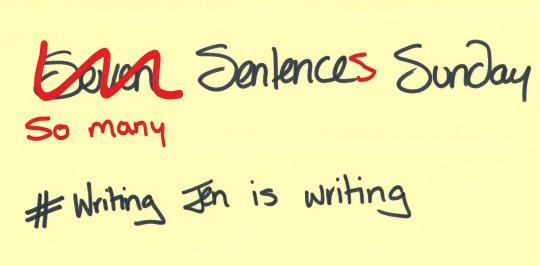
I was tagged by @welcometololaland and I actually have something to share! Keep the good vibes coming so that I get to keep going with this fic. So I'm celebrating with more than seven sentences.
Happy writer, don't care.
"I turned it down, I don't want to go to this stupid thing, but Gran made this huge announcement about how wonderful it will be to have all of her grandchildren at her grand-nephew's wedding and so now I'm being forced into being on show. Again. Moving here was supposed to stop this."
"Is this the wedding next month?"
"Yeah."
"OK, we can do that. I can get Liv to take notes for me, she's the only one who's as meticulous as I am. I can submit my assignments online for that week."
"Alex—"
"No argument. If you have to go, if your gran is making a scene about this and forcing your hand?" Alex stood and offered his to Henry. "Well then she gets me too. We're a package deal now."
"Alex," Henry said softly as he was helped to his feet.
"I mean it, baby. She thinks she gets to control the narrative? Well, I have a long and proud tradition of fucking shit up."
Henry laughed and pulled Alex into something that was somewhere between a hug and a slow dance.
"We can go stand by the cake, freak everyone out," Alex offered.
"You know what would really stick in her craw?" Henry said, pulling back to look at Alex, a glint in his eye. "You and me dancing a waltz with every other couple."
"I have no idea how to waltz."
"It's pretty easy, darling, just follow my lead."
Alex laughed as Henry spun him around the open floor, the spaces that would be filled with furniture and things and made into a home for them.
Lola tagged everything (I think) but my little list...
@capseycartwright @strandnreyes @iboatedhere @kiwiana-writes
@goodways @nontoxic-writes @ YOU for the open tag
#several sentence sunday#writing jen is writing#firstprince#fic: masters of your own destiny#Jen's Super Secret FirstPrince fic#alex claremont diaz#henry fox mountchristen windsor#prince henry of wales#red white and royal blue#rwrb#otp: history huh
33 notes
·
View notes
Note
I loved Ryan’s answer for the podcast sneak peak. But I’ve also never doubted if Ryan or Oliver wanted buddie to happen. What I am weary about though is now that Buck is official bisexual
They have Ryan in all of these interviews now saying Eddie is hetero (which yes is true they have just never actually had anyone say that out loud until now) and what seems to be almost every episode we see Eddie this season now having sex with a woman or talking about sex with a woman or stills of Eddie kissing women. Hell just two episodes ago we saw Eddie having sex with a woman while he was having lunch with his girlfriend.
Ryan and Oliver are open to it sure but the show itself seems to be driving home a much more pointed look at Eddie with women only narrative.
Hello Nonny! How are you today? I’m having a blast now that fandom life is thriving.
Okay, first of all:
Ryan and Oliver are only talking about Buddie because FINALLY they are allowed to talk about them. I have an inkling that they did want to go the Buddie route years ago (as a natural progression of the bi Buck storyline they were planning around season 4), but they weren’t allowed. That’s the whole reason Oliver stopped talking about them and stopped engaging with the fandom through social media. He didn’t want to mislead people.
Ryan has never been as open as Oliver on social media and some people saw this as ‘evidence’ that he didn’t want to talk about Buddie because he didn’t want to do it. I never thought about it in this way, because Ryan is obviously a lot more private than Oliver when it comes to social media. To me, it was always more a case of ‘it isn’t that he doesn’t want it, but that he just doesn’t want to talk about it.’ To him it was probably a non-issue because (as we found out a couple of weeks ago) Fox didn’t want the storyline to happen. There was no way to make it happen and he let it go. But he also, has always maintained that he was open to the storyline if it would ever come up. Basically the only thing they were allowed to say.
Second:
Of course Ryan is saying that ‘right now’ Eddie is heterosexual, because he is. He has only been with women at this point, not with a lot of success, mind you. But keep in mind that only two months ago Buck was also heterosexual as far as we knew. Some of us had headcanons that he was bisexual, but as long as it wasn’t stated or shown in the show, it was only that.
Now take a look at Eddie. He has only been with women, but some people stll have headcanons that he is also bisexual or even gay. I myself like to think that he is demisexual. But these are headcanons right now. As long as it isn’t stated or shown in the show, it is only that.
So, Buck was very heterosexual for many seasons, having many girlfriends. No sign of any interest in men, only some very heavy subtextual signs maybe. Then, in one single episode, BOOM he is outed as a bisexual.
So, Eddie is very heterosexual. Has been for many seasons now, having a (sadly deceased) wife and two girlfriends (no, I’m not counting Kim at this point, because we don’t know where this storyline is going). No signs of any interest in men, only some very heavy subtextual signs maybe.
Then, possibly, in one single episode (or many episodes, because I feel like Eddie will need a lot more time), somewhere in the future, maybe season 8, he is outed as a bisexual man/gay man/demisexual man/…
What would be the difference? I tell you what it is. There is no difference. It is literally the same thing.
Third:
Eddie having a lot of sex with women, kissing women…
First of all, have you met Buck? Do you remember that, from season 1 up until season 6, he had a ton of sex and kissed many women. How very hetero of him. But low and behold, in season 7 he comes out as bisexual and gets to enjoy even more kisses and sex. This time with a man.
So, what is so different about Eddie? Yes, he has a much more complicated relationship with sex than Buck, especially casual sex. Eddie has been shown as someone who only has sex within a relationship (for now we don’t know if he slept with Kim, so I’m leaving her out of this for a moment). He obviously liked sex with Shannon, but with Ana there were a lot of problems. We never even saw them kissing and he got actual panic attacks. He seems to enjoy sex with Marisol up to a certain point, but when it gets to be too much (with the whole Catholic guilt thing), he runs away to Buck’s loft. Very ‘heterosexual’ of him by the way. 0_O
I’m going to quote @buddiebeginz here, because she said something really interesting when we were talking about this topic earlier:
“I don’t think it’s so much that the show is trying to drive home how straight Eddie is but rather what we’re seeing and feeling is Eddie trying to fit some role. And I do feel like some of this is connected to Buck coming out to Eddie, Eddie having spent time with Tommy, Eddie seeing Buck and Tommy together, Eddie seeing Buck come out to everyone. There’s a reason why we haven’t previously seen Eddie with women as often in the show, especially when it comes to sex. In fact before this season I think we only really saw him in bed with Shannon which is another reason I think he’s trying to push himself right now with Marisol.
I also think that’s part of why the stuff with Shannon is coming back up. I think Eddie is pushing himself with Marisol like he did with Ana deluding himself into thinking it’s what he wants because it’s what he thinks he’s supposed to have. But because he’s not happy he latches on to what is familiar which is the only love he ever knew which is Shannon.”
So basically it’s almost as if he is pushing himself to ‘fit’ into a mold that hasn’t felt ‘right’ for a very long time now.
His life is unravelling as we speak and pretty soon he is going to hit rock bottom, nowhere left to hide. It’s only then that he’ll be forced to look at his life, the decisions he made and the way he forced himself to get out there and find a new wife and ‘mother’ for Chris.
In an earlier interview Ryan said that Eddie was going to feel isolated by the end of season 7, going into season 8. But eventually he would recover and get a fresh start in life. It would only make narrative sense to naturally progress the story they have been telling for almost six seasons now, Eddie’s perfect partner isn’t a woman at all. It’s Buck. Just as Buck’s perfect partner has been Eddie all along.
Ryan literally said that 'If we live in the truth, whatever happens, happens.' That is not the answer of someone shutting down the ship forever, or shutting down speculation. That is the answer of someone who is more than willing to go there and sees a potential future there for his character.
Right now he is giving the same answers Oliver is. Answers about not wanting to stereotype, how Buddie should happen 'naturally' if it were to happen. I'm almost certain that they sat together in a room with Tim and PR people somewhere before season 7 and post Buck's bisexual outing and agreed on the same vague but honest Buddie answers. The fact that ABC is actively allowing all of these Buddie questions during interviews and Buddie articles is wild. Fox would have never!
Not to mention the show itself. They made the very interesting choice to consistently put Eddie in the Buck/Tommy narrative. He keeps popping up where they are. There is most certainly a reason for that. We'll just have to let the story play out to see what that reason was.
Look, my point is that they’ll get there in the end. Sure, it will take some time, but we've been waiting for so many years now. What's another year? I’m more than willing to wait a little longer. The pay-off will be incredible.
#buddie#eddie diaz#evan buckley#buddie speculation#buddie meta#still securely riding the Buddie train#destination endgame#nonnies galore
48 notes
·
View notes
Text
it's been a while since i posted about it but i do have a whole tag #the worst thing about love dedicated to that theme and i will always treasure the idea (supported by canon) of jason being cursed with accurate memory over the jason-with-varying-forms-of-amnesia fanon. rhato (2011) #3 might be the only good thing written by lobdell in how it aligns with it... jason's fond memory of bruce staying with him instead of going to patrol is a curse to him because it singles him out in a world that has forgotten. in aditf, bruce chooses following the joker instead of going after jay -- and we now know that jay's bitterness irt that matter originated from his expectations built by bruce himself, who was earlier ready to forgo vigilante responsibilities to take care of him... and as i said before, for jay post-res, aditf lasts forever: he's still daring his father to choose him, even if he does not realise it, even if his own identity is too melted into the mask, even if what he wants is bruce sitting on the couch next to him still in costume and not in civvies. he cannot explain it even to himself. and the world in which that was an option- in which there were no repercussions for bruce choosing jason, is long gone. bruce had his part in it. the narrative was already reshaping itself to expel jason early post-crisis, and his death only cemented it-- more than that, bruce's grief did it, it reshaped his own memories of jason as angry, of his expectations as illogical and even petty. jason comes back to a world that others him. and in order to come back to it, he strikes a miltonian pose-- playing the role of a villain since there is nothing else left, no other way to reintegrate himself into this new fabric of universe. but the dissonance between that pose and his memory will only isolate him further, making him hope. hope is a hostile thing for jason todd. so in rhato (2011) #3 he chooses to forget. forgetting does not stick. it never does. the memory will be back and incline him to reach out again, uselessly. the worst thing about love is that he remembers it.
37 notes
·
View notes
Note
love your db analysis posts! i'd love to hear your thoughts on ultimate gohan, if you have any. between him having little to no reaction to finding out everyone on earth is dead, and randomly letting gotenks fight buu instead of himself, he did not seem to be the same character at all to me, and iirc even piccolo says so, i just... find it hard to believe a non-rage-triggered power-up would do that to him.
Much like Android 16, I do wonder if there were more plans for Ultimate Gohan that wound up being scrapped by the shift in narrative direction.
We're first introduced to the concept of Ultimate Gohan as the Elder Kaioshin is explaining his abilities.
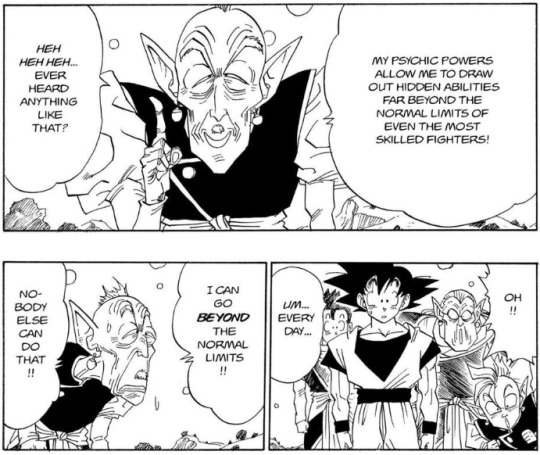
Gohan's dormant power has long been a recurring attribute of his character. In fact, this isn't the first time he's had an elderly sage draw out his dormant power.
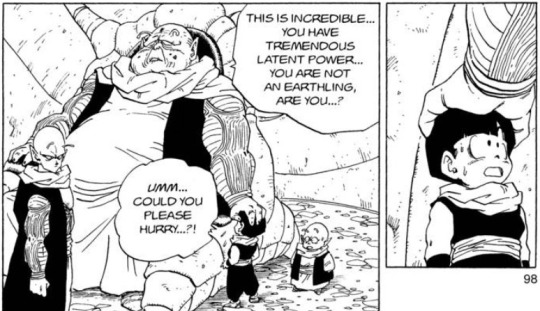
Teaching him to draw out and control his dormant abilities was (stealthily) part of Goku's training with him. That Gohan was finally starting to make it his own and tap into his true ki is the reason for why he was repeatedly unimpressed by Goku's abilities.
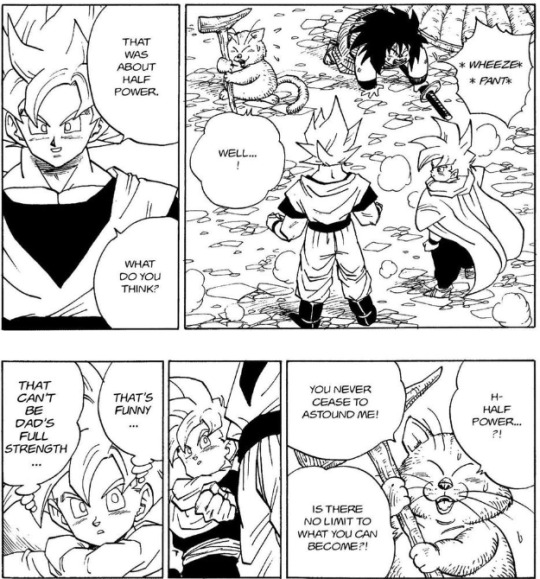
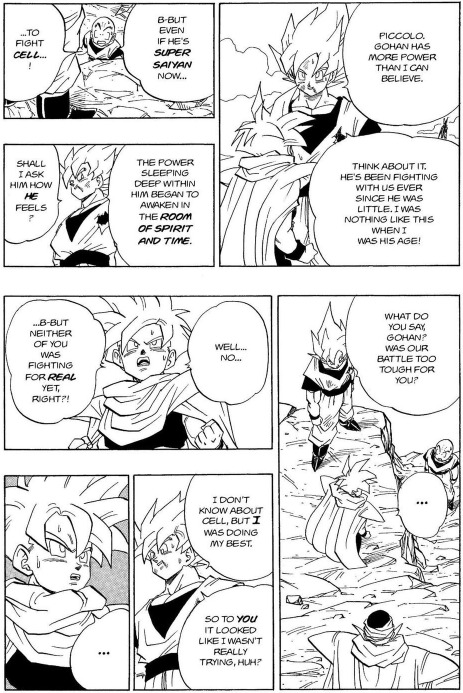
Gohan didn't even realize it, but through his mastery of the Super Saiyan, he'd also begun to take control of and internalize the tremendous ki he'd always had stored away in him. And as he came into his own ki, what he could sense of Goku's ki proportional to his own didn't make sense to him.
Super Saiyan 2 was, then, the culmination of Gohan's development. His full power, channeled through the Super Saiyan and its amplifying effects - both for better and, uh, for worse.
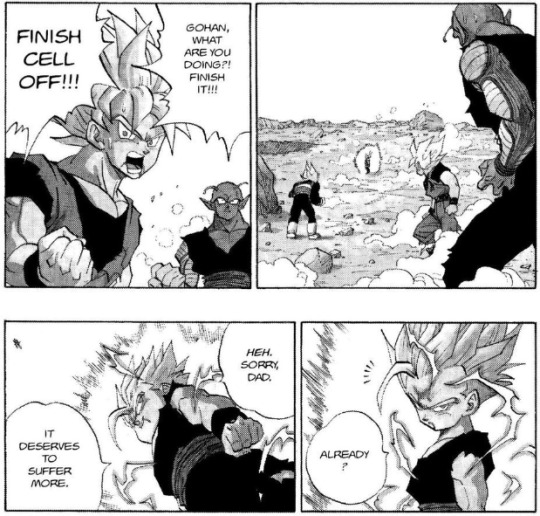
But it's been seven years and Gohan's been indulging in his true love of academia, in accordance with the agreement Goku and Chi-Chi made about his future.

Goku may have successfully escaped having to get a job by conveniently dying at the last possible second, but Gohan's future is set on a course. He's going to be an academic. It's what Chi-Chi wants for him, and it's what Gohan wants for himself; Even Goku acknowledges that.
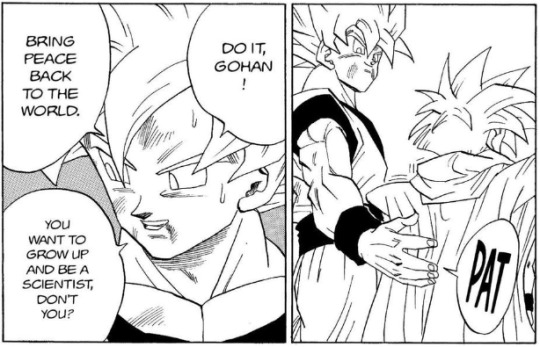
Seven years of rigorous study and zero martial arts practice later, Gohan isn't the guy anymore. In fact, examining just how much Gohan isn't the guy anymore is the whole point of his fight with Dabra.
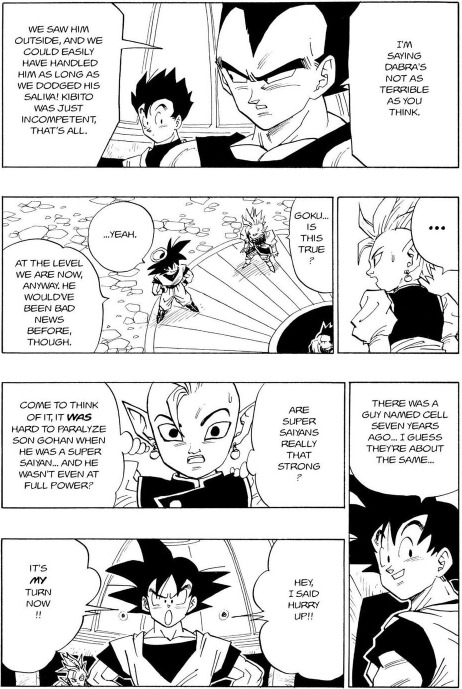
Goku eyeballs Dabra as being roughly around Cell's power. This allows Dabra to serve as a yardstick for Gohan, so we understand what it means for him when he fails to measure up.
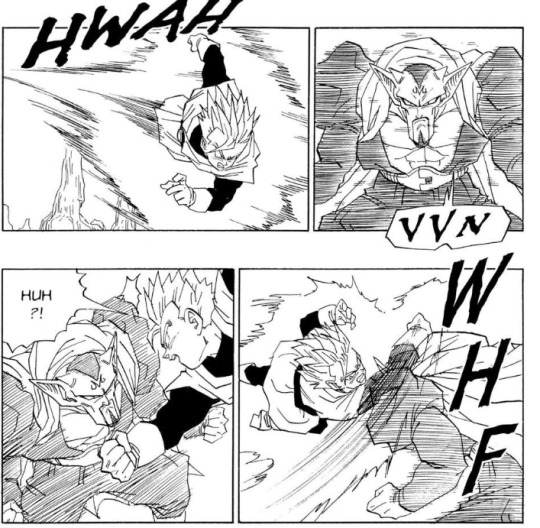
Gohan that was a Zanzoken/Afterimage. Nobody even does those anymore. They became obsolete after ki-sensing was normalized, because everyone can now easily sense which "image" is the real one. The one other time we saw a Zanzoken return post-23rd Tenkaichi Budokai, it was against Frieza, who can't sense ki.
Dabra is mocking you right now. He legit thinks you're so shitty at martial arts that you'll fall for this amateur-hour guff. And he's right.
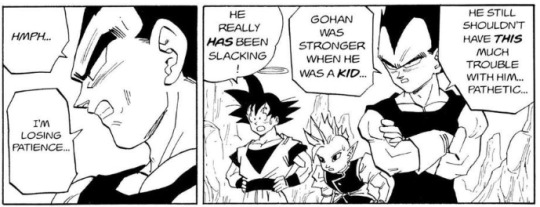
I kinda feel Geets here. If I had to watch my last chance to ever fight my rival get wasted on this, I'd be losing my mind too. He fucking fell for a Zanzoken; Can I just take over already?
So. Yeah. Full Power Gohan isn't a thing anymore. He can still tap into the form - and for some inexplicable reason so can Goku and Vegeta - but this is no longer Peak Potential. Which is where the Elder Kaioshin comes in.
This is a classic formula of Dragon Ball. We've seen it in the RRA, Piccolo, Saiyan, Namek (twice!), and Android arcs. First, Goku gets the shit kicked out of him - sometimes even to the point of being presumed dead.
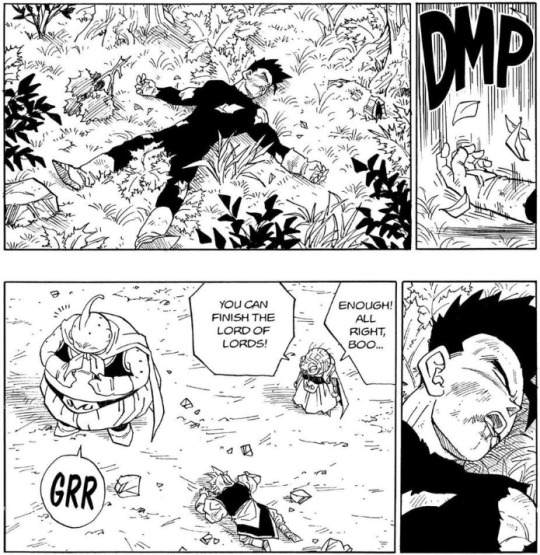
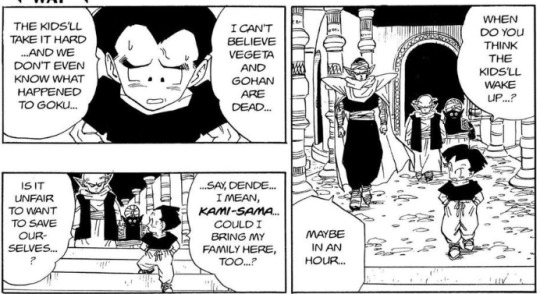
While the surviving cast members scurry about trying to find a way to face the bad guy, Goku - sometimes unbeknownst to them, sometimes not - is recovering and preparing to come back stronger than ever. This typically takes the form of some sort of godly trial or ordeal guaranteed to make him stronger than ever.
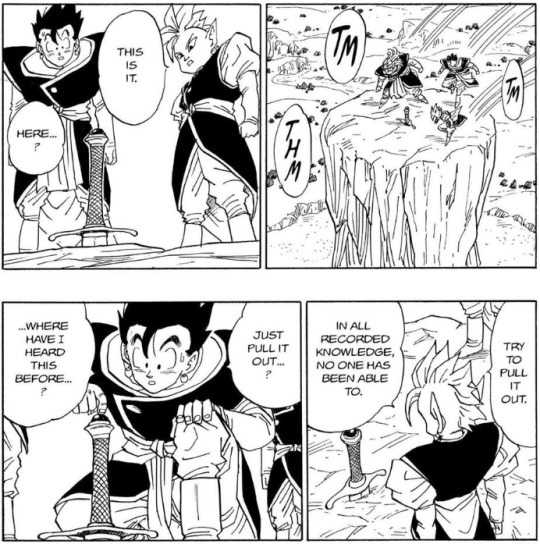
Then, at the 11th hour when all else has failed and all hope is lost, Goku makes his return to have one last epic battle for the fate of the world/universe/cosmos.
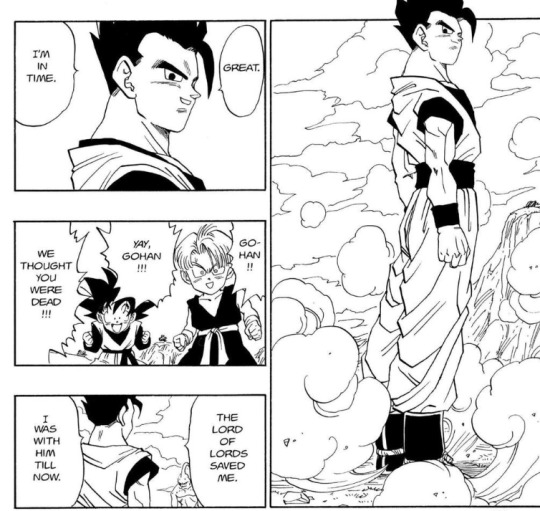
This is the Dragon Ball formula. Has been since the day the Four-Star Dragon Ball saved Goku's life from a lethal Dodonpa. Of course, getting Gohan back up to speed isn't going to be enough, since Majin Buu in his weakest form was able to do this to our Cell-adjacent yardstick.
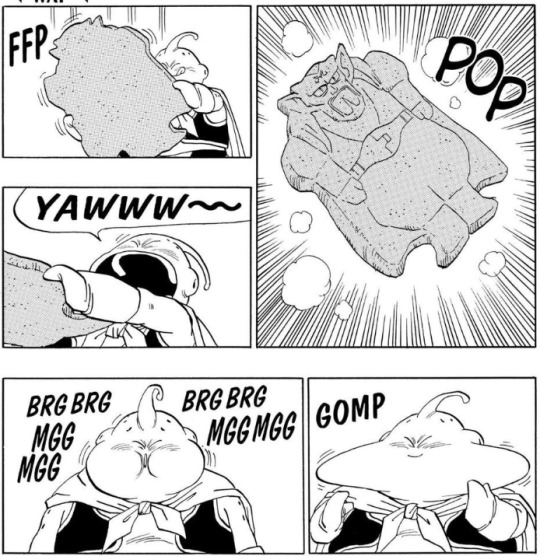
I wonder what Dabra Cookie tastes like? I imagine it's like the wafer part of a Keebler cookie. Sugary and nice on its own but better with fudge.
So. Yeah. If Gohan's going to throw hands with Buu, he's going to need more than the power he fought Cell with. Fortunately, that's the Elder's specialty, and what makes this different than that other time Gohan had his dormant power drawn out.
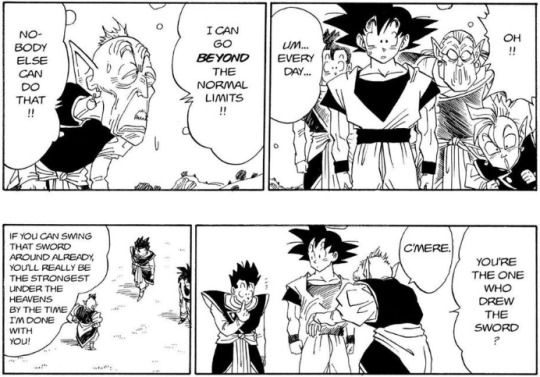
That's right, we're limit-breaking again. Not the limits of human ability, the limits of Saiyan ability, or even the limits of Super Saiyan ability; We're limit-breaking Gohan specifically. Elder Kaioshin's abilities can not only draw out Gohan's full dormant ability but push it beyond Gohan's natural limits.
Full Power Gohan? Nah. This is Limit-Breaker Gohan. Not his full potential; Beyond his potential. Something entirely different from the Super Saiyan, but similar enough that he doesn't require much alternative instruction.
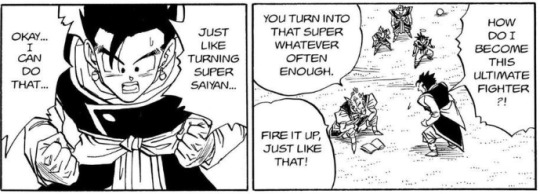
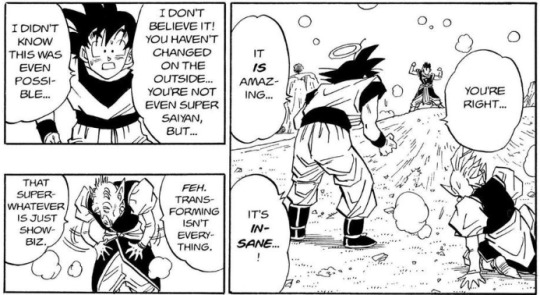
Kinda feels like a thing that shouldn't be able to exist, to be honest. After all the time that's been put into things like the strain of the Kaio-ken on a body, the effects of Frieza having power beyond his limits, or even what trying to use Super Saiyan 3 in a mortal body does to Goku in this very arc.
The idea of Gohan channeling ki beyond his limits seems like it should have some drawbacks, doesn't it? We do get some hints that something's weird about Gohan's new power. Piccolo can't even recognize his ki signature in this state.
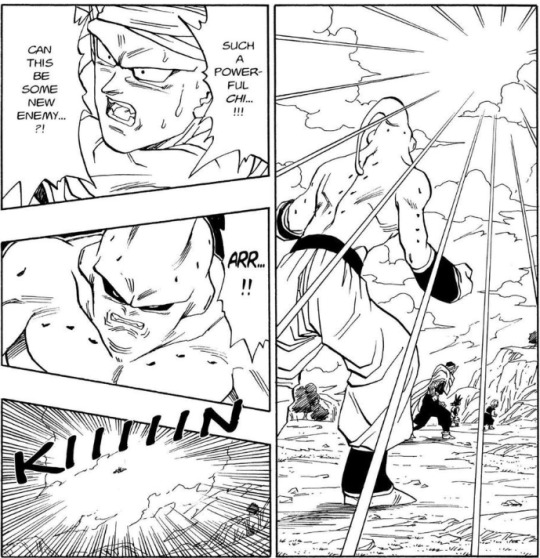
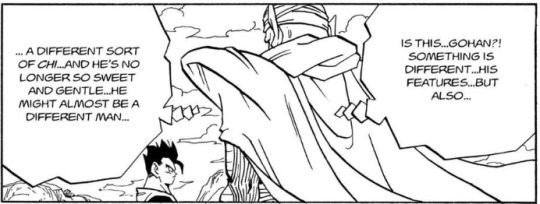
This form is doing some weird shit to his ki. And, as Piccolo notes, Gohan's harder now. Gohan is here to take care of business, and nothing is going to get in his way.
But. Then. The switch happens. Suddenly, Gohan is no longer the protagonist and we need a way for Majin Buu to suddenly be too much for Gohan to handle. So we go from this:
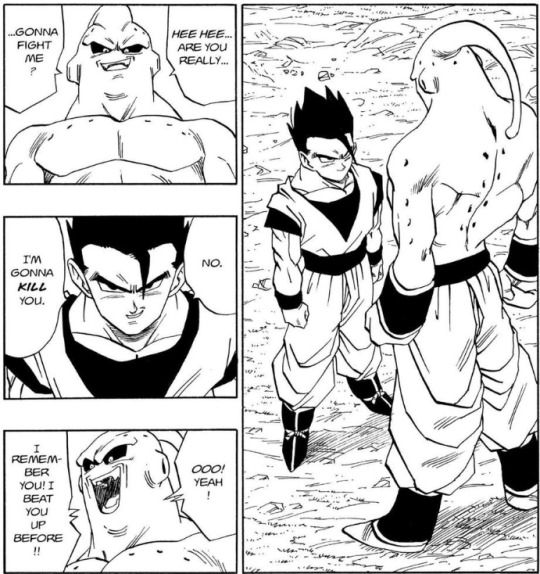
To this:
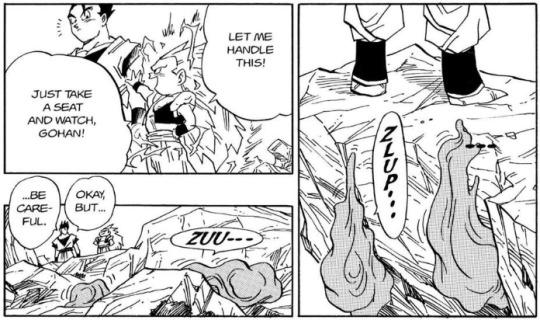
In the span of two chapters. All so that Buu can ass-pull a brand new ability that's never once been mentioned before even though Kaioshin will later cop to having seen him do it twice, that will instantly make Ultimate Gohan stop being a solution to this problem two chapters after his debut.
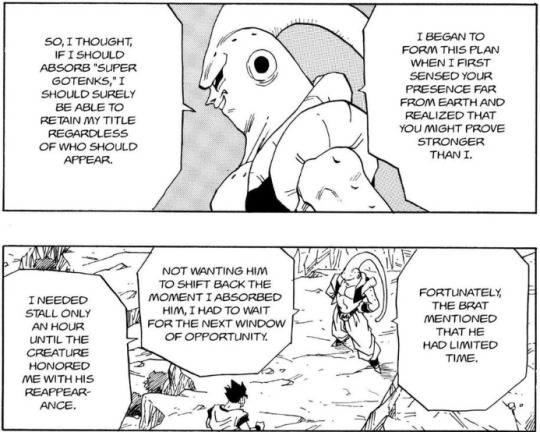
A plan that, in fact, he began putting into place one chapter after Ultimate Gohan's debut. Never in the history of Dragon Ball has a brand new form or ability been obsoleted this quickly.
And then Gohan was basically thrown in the dumpster and this was never spoken of again, with Ultimate Gohan just becoming his new Strongest Transformation in follow-up products. You can feel the climactic final act being aggressively aborted around him, in favor of Goku and Vegeta's third act.
Hell, at one point, Goku even suggests bringing in Gohan to fight Pure Buu. Y'know. Since Ultimate Gohan is the strongest in the universe and all that. But Vegeta nopes it.
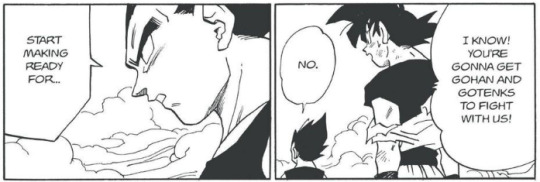
No explanation offered. He's just like, "That's not the plot anymore; Try to keep up, Kakarot." To be fair, Goku had a chance to bring Gohan into this too. They're both aggressively elbowing Gohan out of the spotlight here.
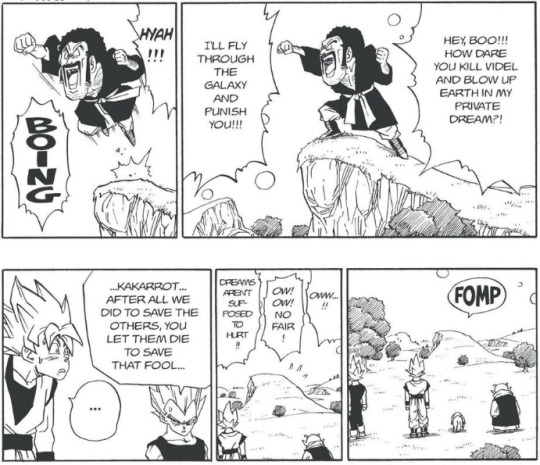
Mad disrespect.
29 notes
·
View notes
Text
listen to me. ive already talked about how ptsd haver gordie would struggle to be around the science team, but think about darnold. okay?
(this turned out longer than i thought it would so im sparing you the experience of scrolling past it. true darnold pepper heads will read on. i know this to be true)
think about her. she was like, one of the only people who ever really Helped rather than hindered gordie during canon, and she did it completely of her own goodwill. the bit of time where everyone met darnold was a distinct respite from the chaos of the rest of black mesa. at least, it was as calm as it could get with the whole crew there fucking around. and darnold, while eccentric and silly, is undeniably the most emotionally intelligent person gordie met that whole time. and she had some self-preservation instinct, causing her to stay behind, which i would say makes darnold way better for gordie to be around than any of the other characters. because darnold knows and understands to some extent what happened, she was there after all, but she's not so intimately connected to the events that it would make gordie uncomfortable.
i think darnolds narrative function as a respite in canon could carry over to post-canon stuff too... i think darnold is someone gordie could confide in and actually get some reasonable responses from. i know a lot of people put tommy in the role of like. designated gordie therapist post-canon but i really can't see that. tommy just does not share the same outwardly friendly and curious demeanor that darnold does, at least not to me. and i can't imagine him really giving a shit about anything gordie says 😭. sorry. but darnold is different to me! i can imagine a frazzled and traumatized gordie going through old work emails trying to find a way to contact darnold again, looking for closure she'll never get. i can imagine her contacting darnold, anxious out of her mind, but finding that, when they do eventually meet up for coffee and darnold does some wacky shit to her own drink for funsies, she can roll with this. this is nice, to her. i think she can be a lesbo about it to be quite honest with you.
i have this scene in my head of like. somebody— probably coomer— throwing some kind of party and of course gordie feels obligated to come despite knowing in her heart its a terrible idea. and of course, she ends up spending much of the party standing awkwardly in a corner trying not to freak the fuck out and jumping out of her skin when coomer gives her a friendly (hard as fuck) punch on the arm. darnold has been spending the whole party rummaging around the bar and making all kinds of beautiful and fucked up cocktails, and when she notices gordie shes like "dear god that poor thing." so she makes a special little drink just for her, approaches gordie, and offers it to her, saying: "you seem a little glum. this should cheer you up!" and gordie breaks down sobbing on the floor because its so nice and shes so overwhelmed and nobody has shown her that kind of kindness and generosity in so long.
darnold also internally freaks out a little bit, scared she fucked something up, but she reasons that regardless of why gordie's crying, it's probably a good idea to take her outside and away from all the lights and sounds. so she does; she helps gordie up, escorts her out to the porch, sits her down. and they talk. gordie apologizes profusely for ruining the party and being weird and whatever and darnold earnestly replies that she was only there for the drinks anyways, she doesn't quite care for parties in the first place. gordie chugs the cute lil drink darnold gave her, and its good, and she tells darnold as much. darnold is very thankful that its so dark out because she is so so so flustered and she hopes gordie can't tell. gordie leans on her, though darnold is well over a foot shorter than gordie, so really it's functionally gordie resting her head on top of darnold's.
gordie is very much a lightweight and she gets more drunk from that one little glass than someone whos like 6'2" should, so darnold offers to drive her home to her apartment. gordie agrees, and she's even more handsy with people when she's drunk, so she's all holding onto darnold for support and rubbing her thumbs into her shirt and getting distracted. it is not good for darnolds composure in the slightest but she is trying so very hard to be normal about it. they make it back to gordie's apartment.
as they make it inside, gordie, drunk on both alcohol and the overwhelming feeling of being cared for for the first time in ages, tries to kiss darnold. darnold is a hopeless romantic to me. she wants to accept so bad but she's responsible, so she laughs it off and tells gordie they should get her to bed. gordie agrees and within minutes she's out like a light.
darnold stays the night, hopeful for the morning.
#barking#welcome to my twisted mind.#hlvrai#freenold#hlvrai orange soda#gordie freewoman#gordon feetman#darnold pepper
26 notes
·
View notes
Note
Can I ask why you would dis-recommend Decolonising Trans/Gender 101? I had heard good things about it and it is on my shortlist to check out.
So, both in the title ("101") and the introduction, binaohan is expressing a commitment to writing a text that can serve as an effective introductory reading for people looking to understand the relationships between transness and colonization. I would expect that with a commitment like this, the text is both cleanly argued and, you know, doesn't make very many false or misleading claims that could send the unfamiliar reader down a garden path. My experience was that this is not the case!
For example, binaohan asserts several times that 15th and 16th century colonialism marks the beginning of transmisogyny and the gender binary. As though there was no transmisogyny before this, in e.g. byzantine surgical practice or roman rhetoric! As though misogyny and its commitment to the opposition of men to women did not precede the use of misogyny as a technology of european colonialism. I just don't think this is a true or useful claim.
Or, take binaohan's defense of family structure against coming-out narratives—the criticism being that white trans culture presents coming out as an assertion of agency, but that this overlooks racialized experiences of commitment to the family over and above the notion that coming out is the only way to be true to oneself. Criticism of coming-out-as-responsibility is fair, but I don't think we should be doing "families are good as long as they're not nuclear" here.
There's a whole section on how "passing" and "stealth" language is essentially compromised because "trans women don't 'pass' as women, they just are women" (paraphrase). But this is just wordplay; nobody is using these terms with those connotations but to denote important material facts about moving thru the world as trans. And the section gives the impression that there's nothing important being done with these uses of language.
The book leans a bit too much on privilege-language, and combines it with gender-eternalism: that if you are a man, you were always a man, and if you are a woman, you were always a woman. This is a self-narrative that works for many trans people. It also doesn't work for many others, including e.g. trans lesbians I know who are comfortable narrativizing themselves as having been boys. I wouldn't want someone to read binaohan's prescription, delivered in the second person, and take it at face value.
I also didn't think I'd ever say this, but the book overcorrects against transandrophobia-truther arguments, denying that "transphobia" is a coherent concept. Now, I'm open to a particular line of reasoning: that perhaps all trans-antagonisms are reducible to mechanisms of transmisogyny. But that's not what's done here, and the possibility of something like anti-transmasculinity (not necessarily in those terms) is not even acknowledged.
I think binaohan writes effectively about the particulars of both contemporary and historical Tagalog gendered experience and embodiment. Those were the sections of the book I most enjoyed. I just thought they had been slot in between a great deal of arguments and claims I would not want to present to someone looking for a "101". I don't think the book succeeds at being the pedagogical text it wants to be.
#ask answer#binaohan#sry this is mostly from mempry omw to my first fighting game tournament wish me.luck!#i will Lose Badly
23 notes
·
View notes
Note
please do tell me about Beika and Ichiya I also have a lot of thoughts abt them and I want to hear urs

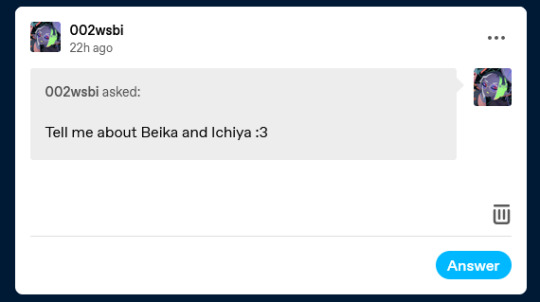
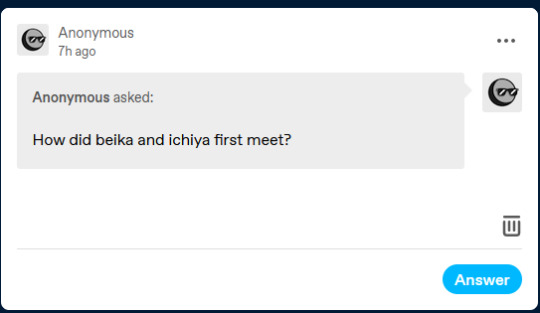

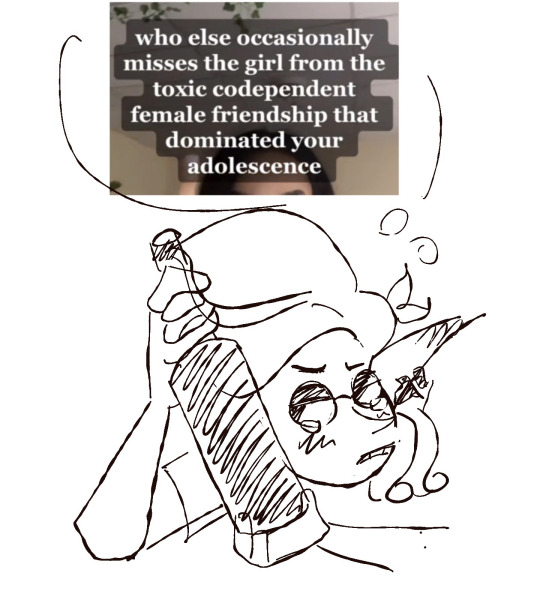
(First of all, thank you for indulging me :> Lots of headcanons coming your way)
I headcanon Beika and Ichiya to have been very early childhood best friends to the point there isn't a point of Beika's childhood that doesn't have Ichiya in it, as far as Beika remembers. It always was Ichiya and Beika, Beika and Ichiya (until suddenly very suddenly it wasn't and Beika had to find a way to be herself without Ichiya for the first time.)
Although I use the word homoerotic I don't know if I interpret them as romantic or platonic, just that it was an intense form of love whichever it is that it completely rewired Beika's brain in it's presence AND absensce.
More Under the Cut bc this got LONG
This blurb from Splat 3 artbook (as translated by Ki Rassicas) has shaped how I interpret Ichiya.
The young people who grew up in Splatsville take pride in being born and raised in the Splatlands, and there is an extremely strong sense of solidarity in the community. They deeply cherish their old local culture, which is unsophisticated and simple, yet strong. At the same time, they like to make fun of urban areas such as Inkopolis for acting like they’re “all that”. On the other hand, many of them secretly yearn for that sophisticated, high-collar, Inkopolis culture.
I headcanon that the initial plan to have been to leave together.
In C-side's introduction tweets it is said that C-side (which ofc includes Beika) came from poverty and had to teach themselves how to play. Considering Ichiya is also self taught probably because of the same reasons, I think comforts of Inkopolis called for Ichiya, who also with his charms convinced Beika to believe in a better life out there is possible. Inkopolis gave these two kids who had nothing to their name and gave them hope and when present had nothing to offer to them it was their future together that kept them going.
I also believe Ichiya chose music as their way of getting out of Splatsville. When Ichiya picked the guitar, Beika happily chose to support Ichiya, as bassists do with their guitarists. (Uotora was also there but you didn't ask for Uotora, maybe later) I think they wrote Now or Never together, not one or the other wrote it more than other (which makes Beika both in the right and the wrong ig). Considering Beika's way of getting pay back for Now or Never was making Splattack, Ichiya's solo, into a duet which she shares with Kikura, i think original Now or Never was a duet Beika and Ichiya shared together.
As I vaguely alluded, the relationship they had was somewhat codependent on Beika's side. While saying so, I don't think Ichiya was aware how much he meant to Beika or took advantage of it, at least knowingly. I think he thought it as someone who always listened to him that he could always fall back to. Y'know, friend stuff :))
It is a lot of "I think"s but I think the fight that tore them apart was initially stemmed from very small disagreement about their music (creative differences and all :]) that Ichiya took as betrayal, and I already talked about how I think Ichiya wasn't used to being told no.
Ichiya took off very shortly after without they could make up (and i think they would have made up) Beika felt very lost for the first time in her life, without "guidance".
(I also vaguely believe Namida and Beika could have similar personalities/can serve as narrative foils, both being squids in button-up shirts with orange tentacles that have ( actually very similar) pink tips. Ichiya's best friends.)
Considering Splattack canonically was the first demo of Squid Squad to be shared in internet and leaked before all the others, AND considering Splattack is how Beika attacks Ichiya back, i think this was the song that Beika says Ichiya showed her.
So what happened, at least in Beika's point of view was:
Ichiya left Beika without second thought and took off with Beika's chance at a future. (He actually never cared)
Ichiya got a new band (You were always disposable)
He replaced Beika with ease and the guy he replaced Beika with was much better (at least at the time) (You are a shit bassist who was never enough)
The moment Ichiya replaced Beika, he was Factually better off. He thrived. He was Famous in Inkopolis. (You were a burden)
This sort of thing is ego crushing, you know. I like thinking Beika would have quit music altogether if not for Uotora bringing Kikura into Beika's life, which Beika couldn't be more grateful to both for (maybe more on this later also). Finding new and meaningful relationships at last got Beika back on her feet, though these things weighed on Beika way until C-side actually found success 7 years later.
I do think Beika too, as she said recorded Now or Never, but didn't release it, because she was ready to move on. It was a song they wrote together, she had no more right to it than Ichiya, so out of what respect she had to their time together, C-side kept it to themselves.
THEN SQUID SQUAD RELEASES NOW OR NEVER.
And apperantly Ichiya has none of that respect Beika had for Ichiya. Had. Not anymore.
In the end, I think as C-side grew as a band, so did their bond, and so did Beika's appreciation for everything Splatsville did for her. I think with time she realized what she really wanted was not Inkopolis itself, and if Splatsville had the means she would have never tried to leave in the first place, hence starting to rep for Splatsville with everything she had (I talked about it in my askblog hehe) . And as she grew as a musician and at last gained the appreciation she grew to deserve, and with how much trust she shows for C-side in tweets (of course kikura would come back, and uotora and beika would let them back in), she not only disproved much of her self doubts about her inadequacy, she also doesn't feel people would leave her the moment they would have the chance.
At least, not until she gets lonely, when she is back at that moment when she was yet to have Uotora and Kikura supporting her.
On Ichiya's side, he was NEVER aware of how much he hurt Beika, so all of this is so petty. Imagine dragging shit from when you were 14-ish and now you are 23-ish. He doesn't understand attt alllll how this is all still relevant??
TLDR: Beika is like a fucked up Elle Woods if you think about it.
23 notes
·
View notes
Note
hello! i have a question, but i dont quite know how to word it….
i like listening to people’s thoughts on hxh, because sometimes its difficult to collect my own thoughts and hearing others articulate it helps me form my own analysis. usually it clears up confusions on narrative choices, however this thing still confuses me because ive seen lots of meta which sometimes conflict with each other or infos from the show. maybe i missed something?
i dont want to link anybody because i dont want to “call them out” but its a frequent opinion ive come across, so not one person. but what i hear sometimes goes along the lines of: gon vowed to sacrifice everything to defeat pitou -> killua arrives -> despite going through with his jajanken, killua’s presence causes gon to realize he doesnt actually want at all to sacrifice everything and the vow is broken (causing him to lose his nen when he recovers from the physical toll)
i really love this reading. the scene where gon turns to killua right before the screen goes white has always been impactful and seemed important to me for reasons i cant explain. but i’m reluctant to adopt it because the way i understood the nen vow was that it was actually a condition—that gon would only use this power to kill pitou, and then per the “rules” he would lose everything as equivalent exchange when pitou was defeated. and that the reason why his nen was lost was because nanika healed him as he was—which was nen-lost. but the show mentions vows and conditions in conjunction so much sometimes the difference gets muddled in my brain, so i suppose im confused about that as well.
i guess im just asking your thoughts on killua and gon’s love for him potentially being the thing to cause gon’s vow/condition to break. i think its a really sweet idea but im not sure if the mechanics of what exactly gon did to kill pitou support it
sorry for the long ask. please have a nice day!!!!!
Hello! Great question!
So, my way of understanding it is that Gon traded all of his nen potential (meaning all of his nen he had at that time and all of the nen he would have ever had in the future) in order to achieve his adult form and have enough power to kill Pitou. By the time he had achieved that form, he was already doomed to have no nen once he used up the massive but finite amount he had, which was his whole lifetime worth. Like taking out a loan on the full amount of money you'll ever make in your lifetime and then burning it all, but more abstract because it's not money.
It very well may have killed him as well, if not for Killua arriving. Think of the cost to his body to unnaturally achieve that form and use that much nen, which is what Killua recoils at realizing when he sees Gon in that form. I'm sure this is why he ended up as such a withered husk afterwards.
Killua showing up definitely saved him, however, both because he helped him dodge Pitou's Terpsichora and in a more far-reaching emotional sense as well. I think when Killua arrived and called his name that final time, it made Gon realize that he wasn't just giving up his own future--he was giving up his future with Killua as well, and by giving up his life it was going to destroy Killua and leave him alone. Gon had steeled himself to die prior to this, but looking back at Killua's face, his expression entirely changes, softens. As a result, I think Gon holds back a bit with his final Rock and preserves himself just enough to keep his body going. Then Nanika heals Gon's body, but this doesn't undo the nen contract he made--even though his body fully recovers, he did still give up all his nen potential, after all.
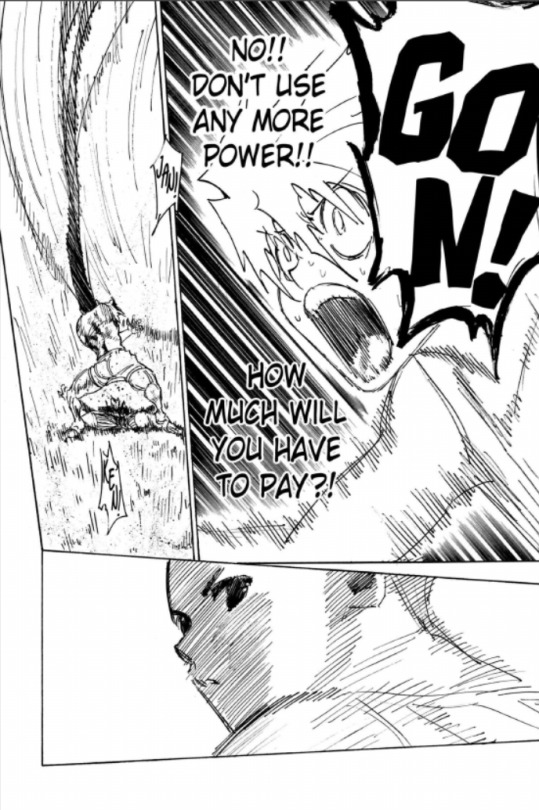
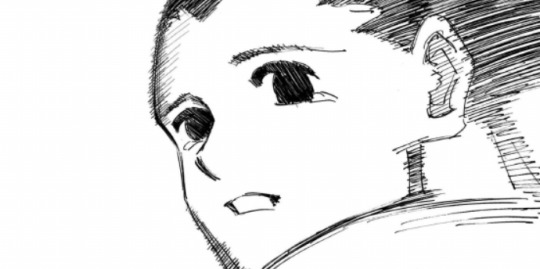
(I'm very sorry for posting these pages, know that it breaks my heart to look at them.)
So, the way I see the scene, it's less about the mechanics of it, as that's relatively straightforward. Gon losing his nen was already set when he decided he wanted to give it all up in order to be strong enough to defeat Pitou. It's more about how Killua reaching Gon impacted him emotionally and made him hold back to the degree he could at the very end. Because at that final moment Killua was able to reach him at last--by saying his name, an echo of other scenes in the arc with Meruem and Komugi.
I absolutely think the intent of that scene is that Killua has become Gon's light and saved him--by showing Gon that he wasn't alone, that there was someone else worth living for, that Killua cares about him and doesn't want to lose him. Gon lost sight of that previously amid his trauma and guilt, but in that final moment, he truly sees Killua's horror and pain at what he's doing, and Gon realizes he doesn't want to leave Killua behind forever. Gon manages to barely survive as a result.
#hunter x hunter#hxh#gon#killua#killugon#gonkillu#meta#asks#anonymous#my posts#chimera ant arc#ugh it's painful examining this scene in depth#just heartbreaking#but it's definitely about how killua's love saves gon#tw: suicide
17 notes
·
View notes
Text
Tabled 7
And with this at-long-last final part, Tabled (my lengthy @b-and-w-holiday-gift-exchange offering for @barbarawar ) comes to an end. Does that end justify the tortuous (and torturous) trip? Probably not, but something something journey destination... it all began with “Myka sits at tables and tells lies,” and part 1, part 2, part 3, part 4, part 5, and part 6 gave what I hope was a reasonable explanation for how Myka might have so fallen, as well as how she could have begun to scramble up (spoiler: with a lot of help). Anyway, she’s just got back to South Dakota—having come to a tentative understanding with Helena—only to find Mrs. Frederic waiting for her at the airport (!!).
Tabled 7
Myka has spent an evening, a night, and the entire subsequent day on her trek back to South Dakota, so her trip as a whole has now stretched to over thirty-six hours, during which she’s had emotional nadirs, shocks, and acmes; adrenaline overloads, ebbs, and re-overloads; minimal amounts of minimally palatable airport food; and far too much coffee, both interior and exterior. She desperately needs a shower, clean clothes, and, above absolutely all, some sleep lying down in a bed. Some sleep that way.
So she’s having trouble processing what she sees. Has Mrs. Frederic divined her ultimate intention and thus appeared here to prevent her from burning it all down? This possibility should strengthen her resolve; instead, it makes her want to turn and run away.
Unfortunately, she’s now through security, and she can’t turn around. Thanks a lot, DHS.
But please, she goes on to pray, not another table. And: Extra-please, not another lecture about children.
Can the people around her in the airport see Mrs. Frederic? They seem to be moving more slowly, less noisily, than reality usually offers. Or are they? It’s hard to know, here in this quiet, draggy little transit-place...
Mrs. Frederic puts a bow on the weird by pronouncing, “I have spoken with several people today. Yet you are my determinative interlocutor.”
That sounds like Myka might be a very few words away from being sent to a penal colony. Or, no: bronzed. The ultimate irony. Utterly Warehousian.
“I have for you the following salient information,” Mrs. Frederic continues, and Myka doesn’t even bother bracing herself, because she’ll have to take it, regardless. She might as well be rattled by the full impact. “I am prepared to have words with Agent Lattimer.”
She should have braced. “You are?” she asks, wishing she could sound indifferent about the prospect, wishing the idea of such words didn’t add fuel to her gut’s terror that Mrs. Frederic knows all about Myka’s meeting with Helena, a terror now compounded by the prospect of her telling Pete of it, and the further prospect that his having been told will be an additional, far higher bar over which Myka must clamber.
“Should those words occur,” Mrs. Frederic says, and now Myka does brace, “your brief liaison will seem but a dream to him.”
What... what? No bar, no clamber? Instead, deliverance? Myka, whiplash-befuddled, is struck dumb.
Mrs. Frederic waits. Her patience, as long as it lasts, is admirable, if surprising. Then she quirks an eyebrow.
It makes Myka think of Helena—and that allows her to breathe. To soften.
Mrs. Frederic softens too: she lowers the eyebrow. “Is that truly what you wish?” she asks, carefully, as if she’s prepared also to withdraw credit from the source who conveyed to her the substance of Myka’s wants. As if Myka, given one last beneficent chance, can surely be gentled into exercising her better judgment and choosing the certain path.
The sliver of solicitude allows Myka to consider Mrs. Frederic’s motives with a new charity: she may have been driven not by stereotype, as Myka has suspected, nor malice, as she has feared, but rather by a thoughtful assessment of availability—i.e., here are the Warehouse’s extant resources, and here is how they may best be deployed to ensure an acceptable balance of efficacy and safety.
Myka has spent a great many hours on airplanes and in airports preparing herself for the burn-it-down possibility, but the fact of the matter is that she, too, cares about efficacy.
She cares even more about safety.
The additional fact of the matter, however, is that she wants a future untethered from such calculations—except as reckoned by, and between, her and Helena.
So if Mrs. Frederic is willing to help fix what she had a heavy hand in breaking? There’s probably a downside, but Myka will suffer it for this unexpected upside.
“Yes. It is. Thank you,” she says.
“No,” Mrs. Frederic says, now differently severe. “Agent Jinks.”
“Steve? What about him?”
“Thank him.”
****
Myka finds the B&B dark and silent, lacking even a video-game glow and hum from Claudia’s room. Sadly, the quietude doesn’t yield sleep; rather than knitting up her exceptionally raveled sleeve of care, she tries and fails to keep “here’s how this might go” scenarios from playing in her head until she can reasonably go downstairs and begin making morning noises.
As the others appear, she tries to act as if nothing has changed.
Claudia enthuses, “Storms no match for you!” which is flattering but of course entirely untrue.
Pete is in his too-early-to-do-more-than-grunt mode, but he seems to care more about his bowl of Lucky Charms than he does about anything to do with Myka, which tells her that Mrs. Frederic has almost certainly had the promised words with him. The way that buoys her—her shoulders move down and away from her ears, where she hadn’t even realized they’d taken up residence—is probably unseemly, but she doesn’t care.
Then Abigail walks in, and her eye-flick between Pete and Myka suggests she knows everything, which she probably does, but even if she all she might have had were suspicions, they’ve probably been confirmed by Myka’s radical change in posture.
A twinge of guilt at having allowed her body to reveal her relief visits Myka... but she quashes it. That guilt is about parts of the past she’s supposed to be ignoring. Practice. Practice.
When Steve emerges, he busies himself with the first steps of making scrambled eggs. Myka reads this as a tactic, for on workdays Steve generally eats two unheated Pop-Tarts at speed. On lazier mornings, he might undertake toast, but eggs are the rarest of production numbers... and indeed, no one but Myka waits through his meticulous preparation.
“You want some?” he asks, but he’s already sliding his results onto two plates. “Airports,” he says, handing her one.
“So hard to find something normal,” she agrees, “and even when you think you might have, you’re still in a place that isn’t.”
“Sounds like you’re talking about every day here.”
His affect effortlessly encompasses both “perpetually surprised new guy” and “perpetually resigned old hand.” Myka loves him for that facility. “Not about these eggs, though,” she says around mouthfuls, “so thanks.” She pushes her empty plate away. “And, also, thanks.”
“I’ve never seen anyone eat food that fast, so thanks back for the demonstration. But also thanks why?”
“You’re welcome, and also you know why: I have you to thank. Or so I hear from someone who miraculously shifted her thinking about what’s best for me,” and she concludes, “you miracle.”
He gives a little smile and head-shake. “You said to protect you, so that’s what I did. Differently. Once I figured out you were telling me things had changed.”
His figuring? Correct, regardless of anything Myka might have intended to be saying. “Things did change,” she acknowledges, “like you said they would. But listen, what you did. The risk. You shouldn’t have taken that risk for me. In fact people in general should stop taking risks on my behalf.”
His smile grows wider. “We will when you will. Reciprocally.”
“No, no,” Myka says, “I need to take more. On my behalf and everybody else’s.”
“All the more reason you should have the right backup.”
“Well, so should you,” Myka says, fully aware, and fully remorseful, that she hasn’t provided any such thing.
Steve’s smile shifts in a way she doesn’t understand. “I think I’m going to. Maybe in not too long? You know Claud’s doing a lot more Caretakering now.” The doorbell rings. “Oooh, if that’s who I think it is, somebody’s timing is something.”
“Is it?” Myka asks. She trails, a confused duckling, behind Steve as he heads to the door.
“I think you’re about to meet my new partner,” he says.
Myka doesn’t bother asking “Am I?” as he swings the door open, because questions are not being answered sensically.
Her exhaustion is comprehensive, so it’s no surprise she’s hallucinating. She says it aloud, directing a slack-jawed “I’m hallucinating” at both Steve and the doorway-framed Helena as they stand before her, their smiles bizarrely rhyming blends of sheepishness and pride.
They don’t respond. This supports the hallucination conclusion.
Myka moves her right hand, minimally; in this way, she touches Steve, a little backhand to his torso. The purple cotton of his shirt is softer than her knuckles expect.
With her left hand, she reaches out, reaches through the doorway, and pushes, probably harder than she should, against Helena’s right shoulder. Nothing there is soft. The shoulder resists.
Fine. Not a hallucination. Not even a hologram. Everyone’s physically here, breathing and taking up space.
“Her timing,” Myka says to Steve. She’s not quite ready to speak directly to Helena. “It’s definitely something.”
Helena says, “Ssh. Let me reveal my shortcomings to my new partner in my own time.” She’s surpassingly beautiful, here in this moment: glowing with mischief and morning sun.
It’s too much. Myka squints and looks away, back to the comfort of Steve. “Your new partner?” she asks him. “Really?”
“Seems so,” Steve says, right as Helena offers, “As I understand it,” and Myka hears a harmony as their voices overlap. She hadn’t seen this coming, but she might have heard it, if she had thought to listen close enough.
But how could she have thought to, before today? “You both make the world turn a little faster than I’m comfortable with,” she tells Steve.
His smile persists. “Call me on that, no problem. But you really want to argue with H.G. Wells, who by the way is standing right here”—and he gives her a little “you really are, right?” look, which she answers with a minimalist palms-up “I suppose” shrug; more harmony—“about how time moves?”
“If history is any guide,” Helena says to him, “that and many other elements of the oeuvre.”
“I just didn’t think I’d be doing it this morning, is all,” Myka says. She’s trying to bring herself to speak to both of them, but Steve remains her direction of safety.
His brow wrinkles. “If this isn’t okay...”
It would be nice to be able to reassure him, but. “No idea if it’s okay.”
His face clears. “I appreciate your telling the truth. And I guess your voice is less agitated than it could be.”
This garners a snort from Helena. “My dear new partner. Your understatement is a balm.”
“We’ll see if I can keep that up,” he says, visibly nervous.
Myka is, now, able to address Helena. About Steve. “He can. Not always understatement, but the balm part.”
“I’m glad to know it,” Helena says, directing at Steve a formal incline of head.
That incline. Its sweet propriety. Glad. Glad. “I’m glad you’re here,” Myka tells her.
“Thank you,” Helena says. She doesn’t need to add “for saying.” Her hair is shining, here—here!—in this morning sun that illuminates the entryway. Such light visits this space every morning, but Myka has never before seen it ignite Helena’s hair.
This day: new.
“I have something in the car for you,” Helena goes on. “Wait.” She exits the doorway, moving out of the sunbeam’s path. A bright loss.
Myka turns back to Steve. “Wait,” she echoes, shrugging. “There’s not enough time in the world for me to explain to you why that’s ironic.”
“Your own private irony.”
“But you did spare me some waiting. Some not-knowing waiting. And way more than that,” she says, because it needs saying, “you spared me the hard part.”
“I don’t know her very well yet, but I’m pretty sure I didn’t.”
“Oh,” Myka says, because of course she’d meant detaching herself from Pete, but Steve is (also of course) wise and right: each day, however few or many she and Helena manage, will no doubt have its hard parts. Each day of those few or many might itself be the hard part. “But how did you... I mean, did you have this plan all along? Partner and all, and Mrs. Frederic started nodding along as you said it all out loud?”
“Oh god no. I was just trying to ease her away from the you-and-Pete thing, as gently as possible. Turns out she wanted H.G. back ages ago.”
No. No. “She what.”
Steve nods, looking sick. “But—and I hate to be the one telling you this—she thought you didn’t want H.G. back.”
Myka feels sick. The non-sense of this day... no: of these days. “She what,” she says again.
“Because you left her in Boone, she said.”
“Helena was forced to stay in Boone!” she protests, or tries to.
“But you didn’t fight anybody on it. So she thought you were okay with it.”
Of course. Here’s Myka’s inaction again, kicking her legs out from under her. “But if she wanted to bring Helena back, why didn’t she just... do that? Once she decided it was safe to let her out of Boone?”
“Like I said, she thought you didn’t want H.G. to come back. So she was trying to make sure it wouldn’t matter so much to you. If it happened. If you had something else to focus on.”
“Pete,” Myka says, the very idea a heaviness. “Kids?”
“I’m not saying I can read her mind, but yeah, I think that’s how that went. I can tell you she was really surprised to hear you were meeting with H.G. yesterday.”
“In a hotel room in an airport in Chicago,” Myka says. The base fact of it. “Do I want to know how you explained that?”
“All I explained was the airport in Chicago,” Steve says. “I didn’t know about the hotel room part.”
Right. Myka hadn’t said that part out loud. “It’s not what it sounds like.”
“Interesting utterance,” he says, cocking his head, like he’s waiting for more. “Not an immediate lie, But the eventual truth-value, plus my possible eventual headache, depend on what you think I think it sounds like.”
It’s a privilege, this glimpse into the complications of his gift; nevertheless, Myka winces. “I think you think it sounds like what I think it sounds like,” she says. “Like I wish it didn’t. Because I swear to you, it’s not that.”
She prepares herself to dig in and hash out the truth-values, but Steve says, “I get it. No dirty work in those words.”
No dirty work: it’s a diploma. In reverse. Disqualification.
“Anyway I don’t think I made a lot of sense explaining any of it to Mrs. Frederic,” he finishes.
“Enough to save me,” Myka says.
“Yes. Because if you could be happy.”
“You said that before.”
“I did. But now I mean, if you could be happy.”
“If... then?” she asks, logic being what it is.
“Then maybe I could too,” he says.
Myka wants to put an immediate stop to the idea that he would look to her, for that can’t help but end in abject failure. But she gets out only a weak “Don’t” before he continues, “Because I was thinking of a saying: ‘Happy wife, happy life.’”
“I’m not your wife.”
“Better for both of us. I’m just saying it’s a saying. About a person and somebody else. There might be a better word for where you and somebody else are—or, I guess, where you might be headed?—but it wouldn’t rhyme with life. And it’s probably important to rhyme with life.”
Myka’s heart hears him, but she shies away, scoffing, “That’s a leap. Not the rhyming. The saying.”
“Isn’t it always?”
“I don’t want to give you false hope.”
“But if we could both acknowledge that there is hope.”
She’s not sure. She’ll probably never be sure, but in the face of doubt and fear (and “endless wonder,” that misleading canard), she determines to acknowledge it. For Steve’s sake. “Okay,” she says. “In the full knowledge that you’re the one who made the hope possible.”
“No,” Steve says. Serious. Simple. Unfraught. “That’s not what I did.”
Myka has no counterargument. All she can do is say “thank you” yet again, quick and quiet, for suddenly Helena is appearing in the doorway, taking over the space. Myka suspects she’s been waiting for their conversation to end—speaking of timing, this reminds her of the hotel lobby—and she doesn’t know whether to hope Helena was eavesdropping their words or simply their tones.
She’s holding two cardboard coffee cups. Myka gestures for her to hand one over, but Helena shakes her head. “You haven’t texted me.”
So Myka dashes to grab her phone, and “Gh” says the message, the first purchase her fumbling fingers could find, sent as fast as she could remind those fingers how to do that.
Helena sets the cups down on the hall table when her own phone noises (and now Myka doesn’t know whether to be pleased or distressed that a text from her yields a generic ding). She extracts it from the interior of her jacket and smiles. “I bought these, in hope, in the Sioux Falls airport,” she says, “but they’re now cold. No doubt terrible.”
“‘Worth every penny,’ I once heard someone say about coffee,” Myka says.
“Fewer pennies here. In any event, worth to be determined.” Helena is jaunty; it’s very her, but on the edge of too her, hinting that she’s less certain than her initial doorway presentation implied. As Myka now meets Helena’s gaze, she imagines—but hopes she isn’t only imagining—that their vulnerabilities might for once be commensurate.
Helena doesn’t look away.
Steve says, “You know, ‘I was making eggs’ buys you only so much late-for-work in this job.” It’s a transparent attempt to excuse himself, but he does add, “I’m really looking forward to getting to know you, partner.”
“I hope to impress you,” Helena says.
He snort-giggles, then composes himself. Minimally. “H.G. Wells—who isn’t lying!—hopes to impress me. Okay.”
Myka can’t begrudge him his surprised delight, even if it does delay his departure. “Welcome to a world of endless... surprise. She kind of wrote the book.”
“A lot of books,” Steve augments.
Helena waves a hand. “That was Charles. So wordy.”
Steve’s brow furrows—which Myka reads as a bit of confusion over how to negotiate the Helena/Charles disjunction. He says, “Okay. I’m going to the Warehouse,” clearly (smartly) choosing not to start now.
This time he does leave, though Myka is tempted to stop him, to cling to the surer footing afforded by his buffering.
Coward.
But. Then.
Alone, precariously so, Myka and Helena situate themselves across from each other at the dining room table, their promised-coffee cups before them.
Myka supposes she should have foreseen this arrangement—table, coffee—and she should at the very least have queried the book as to what would ensue. Not that she’s had any time for that, which probably means she should now do that, should go and do that, before she finds a way to undercut its foreseen future and make blunders that will prove unsatisfactory.
“Surprise,” Helena says.
“Yes,” Myka concurs, trying for Steve-ish understatement. It doesn’t work; she knows she sounds distressed.
“May I explain?”
“I wish you would.” That comes out better, but Myka realizes that she is literally on the edge of her seat. She sinks backward, trying to make the movement look like relaxation. That probably doesn’t work either.
“The invitation from Steve,” Helena begins, but upon saying his name, she stops. “Before I continue: ‘H.G. Wells who isn’t lying’?”
“He can tell if you are,” Myka says, and she’s gratified to see in Helena’s ensuing eyebrow contortions that she’s conducting the “what exactly have I said to Steve” inventory everyone does when introduced to that fact.
Its result: “Well. Then it’s fortunate I haven’t. To him.” She seems inclined to reflect on the revelation’s full compass.
Myka does love (love!) to watch Helena think. But right now... “Explanation?” she prompts.
“It isn’t complicated,” Helena says.
“That’s unusual.”
Helena bows her head; she smiles, from that bow, up at Myka. It’s flirty. It’s beautiful. “It is,” she says, and she seems to be affirming Myka’s words and her thoughts. “Steve and I had a conversation during which I explained how you and I had left our... situation. And then, a bit later, came his invitation, which I understand was extended at the behest of Mrs. Frederic. The opportunity—the freedom—to be myself again? It was too enticing to refuse. Of course I never would have accepted in the absence of our rapprochement, but given that? Steve was so convinced, and convincing, that all would be well.” She raises her head fully now. “And it cut short the waiting.”
“I said I would hurry,” Myka says, resentful, unsure of why she’s jumped to that.
“Your return required so many flights. Any number of delays might have ensued.”
“Due to the flights?” Myka asks, but she can’t unhear the clear disjunction between those sentences.
“And everything else,” Helena acknowledges, with a head-duck.
Myka knows that duck; it’s worry. “You didn’t trust me?” she asks, but in the question she finds the reason behind her resentment: offense at the idea that Helena had such worries to begin with.
“Can you blame me?” Helena asks this with a little flinch, as if Myka’s judgment must be harsh.
“Yes I can,” Myka says, but soft. “You were supposed to be ignoring all that.”
Her answer causes Helena to raise her head again and smirk—or, no, this isn’t her smirk; rather, it’s a lip-twist that’s more... conspiratorial. She says, “And yet the foundation of trust is past experience. If I ignore the past, on what basis could I trust you?”
Playful, but a jab. Myka retreats into sarcasm, acknowledging it hit the mark: “There’s a flaw in my big idea? Shocking.”
Helena nods, slow with a sigh, as if in sadness at Myka’s imperfection. But she turns serious to say, “In any case, after all that’s happened, I certainly didn’t trust fate either.”
Fate. How they’ve been subject to it... but are they now trying to chivvy it, in a way that will backfire? Myka pushes her fear into words: “What if it’s too soon?”
“Then regret will haunt us to the end of our days,” Helena says, and Myka has to nod to the truth of it. “But consider this: rather than wasting precious time on such questions, shouldn’t we rather be grateful that, after such complications, there is even a whisper of a chance that it may not be too late?”
Too late, too late, too late. Those words have truly haunted Myka. Miraculous that they might not apply. “I don’t want coffee,” she says. Truly.
“What do you want?” Helena asks, like she might really not know.
Well, maybe she doesn’t anymore, given the vast conceptual distance between Myka’s initial saying and now. “I did tell you. I don’t know how many hours ago; I haven’t counted. I’d have to use my hands.”
“Save your hands, but tell me again. I challenge you, however: change the vocabulary.”
Myka can do that. Only a little, here and now, but she can do that. “To save the world. Our world.”
They are breathing at each other and the table is in the way; Myka ideates the drama of grasping its edge, flinging it sideways, clearing her path—but that’s not who she is. Now, more than ever, she needs to be herself.
She stands up and steps decorously to the side and around, slow, savory, even as her body threatens to effervesce.
“Can we do this?” she asks, but she knows, through her inexorable movement, with all its effervescent potential, that they will. Regardless now of consequences.
“I have no idea,” Helena answers.
These could be words of delay, but not here and not now, because regardless, regardless, they will—and at once they’re both moving, as if pressure from a familiarly heartless authority will relegate Helena yet again to disembodiment if they don’t make this fast, and thank god, god, god this once they’re fast enough; they meet and hands are at waists but they’ve touched with hands before... even so, the infinitesimal pause they both take before those hands pull and define is understandable but then over, and their at-last kiss begins as an action but swiftly transforms into a state of being: pressure, presence, soft, sharp, warmth, weight, low, lasting...
After some time—how much time? is this kind of time measurable?—they break apart into staring silence, in the stunned after of the prospect they have spent so long before.
“I can die now,” Myka is moved to murmur, even as she feels its banality as a response to this experience, this knowledge. Because she has at last truly gained the knowledge: she had hoped to gain it, and yet she now understands she had never fully believed she would, if only because fundamental questions—e.g., “what would it feel like to kiss Helena?”—aren’t often answered.
“You most certainly cannot,” Helena ripostes, bracingly practical. “One kiss is no culmination.”
Myka might object to the description of what just happened as “one kiss,” but she’s too busy being unable to process how an actual culmination might feel.
In fact she’s unable to process anything. “I have to sit down,” she says. Of all things, lightheadedness had not been among her expectations. It should have been: because of course her blood is nowhere near her brain.
Passing out will help nothing. Probably. So she backs awkwardly around the table, her logic, such as it is, being: I have to sit, and that is my chair; if I reach it, then I can sit. Fortunately, her reasoning bears out. She breathes into the relief, as she sits, of still being conscious.
Helena says, “If you can’t stand, then I’ll sit beside you.” More logic, here spoken as indulgence.
She situates herself in the closest chair and scoots it nearer, inch by accommodatingly sweet inch, and then she’s in fact sitting beside Myka, like they’re on a carnival ride together, and now they’re both turning sideways—with Myka devoutly grateful for her continued (seated) consciousness—as they steal (back) these kisses, these presses and exultations, that should so long before this have belonged to them.
“This is not enough,” Helena breathes, sultry against Myka’s mouth.
Myka makes a noise of agreement, and she moves for more, to start the movement to more.
Her hands have made their way to Helena’s shoulders, and are anticipating her hair, when she and her hands are startled by a crash-clatter from across the room.
Myka wishes she could simply ignore whatever such noise signifies... but that wish is unrealistic. She removes her hands and opens her eyes.
Claudia is standing in front of the sideboard. Much of the china that had previously adorned it lies around her in ruins. “I swear to god, this is not what it looks like,” she says. She glances down, then shakes her booted foot. A teacup handle falls from it, producing a tiny clink of pain as it hits the floor.
“It looks like you were trying to blink in but got the coordinates wrong,” Myka says. “That’s happened before. But this time you got tangled with the plateware?”
That yields an eyebrow-raise and a finger-point, then: “What I should’ve said was, ‘This is not what it looks like even to someone who knows all the words to my extensive back catalog of Caretakery mistakes.’ The thing is, I blinked in, saw something I was in no way supposed to be seeing, turned my back on that—faster than fast, and I swear I would’ve tried to blink back out but I can’t reset that quick—and I guess I did Wonder Woman arms, because...” She waves down at the china. “This stuff. Or ex–stuff. Unless you’ve got a lot of glue? Which you might. You were pretty stuck to H.G just now, like in a way I’ve never seen before and like I said was in no way supposed to be seeing, but it’s the most spectacular news of this century or any other because all the feels I can’t even!” She clasps her hands up high and squeezes her eyes shut, as if the scene Myka and Helena are presenting is too glorious to behold.
Myka turns from this emotional show to look at Helena. A half-beat later, Helena turns to Myka. Lacking any ready response, they both turn back to Claudia, who opens her eyes, drops her hands, and says, “Your faces are telling me all those words happened out loud.”
“Unfortunately,” Helena says.
“Hi?” Claudia offers, with an apology face.
Helena smiles. “Hello, darling,” she says, warmly.
Their interaction is lovely to witness, but: Warm, Myka thinks, because that’s how Helena’s body is, next to hers. Why, why, why has Claudia appeared now?
“I’d run over and hug you,” Claudia says, “but I see that seat’s taken. Instead I’ll just say I missed you.”
Myka can’t help herself; she accuses, “Not enough, you spy.”
“She called me. Was I supposed to be like ‘oh, it’s H.G., I better not pick up’?”
Myka’s immediate thought is YES. She says in its place an umbrage-laden, “You could have told me.”
“Maybe you don’t understand what you looked like every time you came back from seeing her,” Claudia says. “You think I wanted to make you look like that?”
Helena shifts position beside Myka, legible as a “you are failing to ignore the past” caution; Myka adds to it a self-admonitory on this day of all days. “Fine,” she says. “Not fine at all, but fine.”
“Anyway Artie’s already shouting about how you’re both late for work,” Claudia says.
Myka sighs. “Artie. Shouting. So everyone knows?”
“Well not about this. Which I double-pinky-swear I never meant to know about, even though it was always something to hope about. All Artie knows about, and probably even hopes about, is who works here. There. At that place. And is late. For it? So I guess we should get going?”
Myka can easily imagine agreeing that yes, yes they should get going: result being that she and Helena would proceed to the Warehouse. That place. Additional result, as history has shown, being that something would happen to once again put the promise of this day out of reach.
She sees, now, that she has to act against such results. Act against them. Act.
And she sees something else, something both sickening and enlivening: all her lies, those interventions against truth? They were acts. Sinful ones, but her agency in telling them has fortified her with the necessary heft for this moment.
Her lies were practice.
Morally inexcusable practice, but: she was a feral little fabulist. Now she must put ends before means. Use the muscle; ignore the exercise by which it developed.
So. “No,” she says.
Her refusal disturbs the space, shaping it into a new kind of silence.
In its wake, Claudia offers appraisal: eyes narrowed, jaw tilted. Eventually, she says. “Not entirely sure who I’m talking to now.” She squints tighter, sly-red-fox. “By the way,” she says, calculatedly casual, “your book buddy says hi.”
If anything could knock Myka out of her certainty... certainly, it’s guilt. “Oh god,” she says.
Claudia’s narrow tension relaxes. “Steve and I figured out you were the one doing ‘unauthorized use.’ And it took us a while, but we also figured out what you were unauthorized using.”
“Thanks for not telling on me,” Myka says.
Silence again, until Helena breaks it with, “Myka used an artifact? Was this for personal gain?” She doesn’t look at Myka.
“I literally would never. And neither would Steve.”
Myka wants to say Could we ignore that too. Instead she confesses, “For personal... desperation.”
Now Helena looks. “So at last you understand,” she says. It’s a softer condemnation than Myka might have expected, not that she had expected anything, because until this moment she hadn’t made the connection. Not through the clean line of “so at last.”
But then a new connection, or rather consequence, strikes her: “What’s its downside?” she asks Claudia.
“You don’t know?”
“I didn’t care.” At that, Helena grasps Myka’s hand, tight, and Myka knows she’s going to have to think very hard at some point about this newly realized kinship between them. Right now, though, she’d rather think about the fact that Helena is holding her hand. But for that niggling consequence. “Do I need to care?” she asks.
“It’s a downside, so yeah? But with this guy, it’s a downside-with-a-twist.” She pauses, as if waiting for... guesses? Applause? When neither Myka nor Helena responds, she says an aggrieved, “Anyway, it’s the same as the upside.”
This baffles Myka. “Seeing the future? How is that a downside? I mean maybe in the Cassandra sense, if nobody believes you, but—”
Claudia interrupts, “OOC of you to get that wrong. But I guess OOC is your new IC thing, Ms. ‘No’? Anyway I don’t think you grokked what the artifact is.”
“A book,” Myka says, because... it is? “A future-seeing book.”
“Book, schmook. And future-seeing... schmuture-seeing? It’s an oracle. It doesn’t see the future; it predicts it. Literally, it says in advance: you ask it a question about the future, and it answers. It says it. In advance of that future.”
Helena chuckles. “Etymology strikes again.”
To which Claudia nods. “Right?”
“I still don’t get it,” Myka says. “Saying versus seeing? In my defense, I’m very tired.” She is sorely tempted to put her head down, heedless, here on the table, but she feels Helena tighten her handhold again, a press intelligible as Stay with me. She breathes deep and refocuses.
“Its answer is a decision,” Claudia says. “About the future.”
Helena looks at Myka, then at Claudia. “Now that is power.”
“Also right,” Claudia says. “But it can’t make that decision if nobody asks it to. Myka.”
“I did ask it,” Myka concedes, “but now my head hurts. Are you saying that if I hadn’t asked, then none of this would have happened? Would be happening?” She can’t argue with the outcome, but: upside, downside? Her head does hurt.
Claudia’s face empties. She says, “Asking questions has consequences, Agent Bering.”
Has Claudia been taken over by... something? Myka can’t help it now: “What?” she asks. The word rings a little less desperate, here at home, as a thing she tends to say. But she’s no less lost.
“Sorry,” Claudia says, turning back into herself. “I was trying on my spooky-Mrs.-F suit. Bad fit so far.”
“The art of the gnomic utterance,” Helena intones. Her own utterance doesn’t quite rise to gnomic, but Myka can see more clearly than ever the helios toward which Helena-as-Caretaker might have troped. Losses. Gains. How can Myka place herself in relation to so many competing ledger columns?
“Did you just insult Mrs. F?” Claudia asks, her obvious confusion breaking into Myka’s reckoning. She might as well have said her own Myka-esque “What?”
“What?” Helena then asks, thus squaring that circle.
“The red hat?” Claudia says, gesturing at her own head. “And doing magic or whatever in your garden?”
Sense at last. Myka doesn’t quite suppress a laugh. “Gnomic,” she says. “Means terse. Mysterious. Not gnome-related... or actually, it is, but not those gnomes. Different derivation.”
“Etymology strikes yet again,” Helena says. She suppresses her own laugh—Myka hears it behind that overly serious observation—but not her smile.
“I’m really glad you’re here,” Myka tells her. The fact and experience—correct, appropriate—of their speaking together. “Claudia,” she says (and Claudia is looking at them like they’ve both lost their minds, which they probably have, but not about this), “go to the Warehouse. Keep everybody there. All day. Please.”
Claudia brings her hands together once again in a dramatically audible clap. “I get it. I mean I’d say something about a booty call, but I know that’s not it. You need your day.”
Our day? Our days. Our days, our weeks our months our years.
“Yes,” Myka says.
Helena follows up with, “We do.”
“Hey, but I’m no oracle,” Claudia says. “No predictions here.”
Myka and Helena give her incomprehension again.
“Not ruling out booty call,” she clarifies, laughing, but she backs away as she speaks, now blessedly making her exit—unlike her entrance, through the B&B’s front door.
That means Myka and Helena can—must—make their move. And they do, rising from the table, stepping toward the stairs—but not yet up them, for Myka can’t wait; her hands are at last finding Helena’s hair, and as they do, as she touches and feels, she says, in wonder, “It’s just us. It’s never been like this.”
“Why would you comment on it?” Helena demands, as if Myka taking even an instant to reflect threatens to make the entire situation evaporate. Her hands are busy too, running along Myka’s arms, not quite grasping, but then grasping, and then Myka can’t comment on anything, because her lips are busied, back in that new state of being.
The journey to her bedroom: she had in the past allowed herself to imagine such travel, but carefully, the fantasy within strictures. Policed possibility. The walk, but not its end... not, in fact, the culmination, the sense of which had increasingly eluded her, a frustratingly constant receding of possibility, as if her body were teaching itself over time to echo Helena’s incorporeality, her sensation waning, from body to limbs to fingertips alone, until all vocabularies of touch became words not near enough the tongue.
But now everything is nearing, nearing and blurring, boundaries dissolving, everything her body, her body everything, the stairs the hallway the room the clothes the hands the lips the skin the stumble the fall...
****
Myka slow-motions into consciousness, unable to discern where she is, knowing at first only that wherever it is, she was exhausted before she got there. Got here.
That’s mostly because she can’t remember the preceding events, and experience has established that extreme fatigue is one of the few states that interferes with her otherwise reliable recall.
So she begins to sort it out, blinking sleep-weighted eyes. Her initial perception is that she’s lying in a bed—a bed blessedly recognizable as hers—yet she also seems to be perceiving something else, something absurd: that Helena, of all people, is speaking to her. Speaking unclear words, near to her, while she is in this bed that is hers.
I’m dreaming.
The words resolve: “Are you all right?” Helena asks, and Myka snaps to.
Not dreaming.
She is in her bed, and Helena is here. Their skin is... together. Helena, propped on an elbow, is regarding Myka in full recline.
Myka wants to answer Helena’s question with a strong “yes.” But she isn’t at a table and she doesn’t want Helena to be reminded of her feral fabulisms, not here not now, so instead she dares to ask, “What happened?”
“I believe you fell asleep,” Helena says. “In the middle of things.”
Myka’s first thought is that she can’t imagine a worse blunder. Her second is that of course she can. Her third, which she formulates second by second and piece on piece as her memory returns, is the one she says out loud. “I’m sorry. I’m so, so sorry.”
Helena shakes her head. “I brought you coffee. That was all.”
It’s a damning pronouncement. “You’re saying I could have caffeinated, but instead I ruined everything.” Myka raises her left hand to cover her face. She’d use her right one too, but Helena’s body is trapping that arm. Move, she wants to say. I need both hands. To cover her shame.
Helena uses her free, unpropping hand to remove Myka’s, revealing her face. She interlaces their fingers. “Your sleep has addled you. I’m saying that I brought you a small gift, but in return you’ve given me a far greater one.”
New bafflement. “I have?”
What could possibly be sufficient penance here? “Not the right one.”
“Witnessing your fulfillment of a bodily need.”
Helena offers a considering head movement, a cerebral back-and-forth. “Isn’t it? Proof that you trust me enough to lost consciousness—in this way—so near. Differently meaningful, but meaningful all the same. Particularly to someone who, as you know, occasionally forgets to ‘ignore it.’”
Her words have such depth, in sound and meaning, that Myka can barely process any of it. Particularly given that they are lying down in privacy... and far more.
“What am I supposed to do now?” she asks. Blunder some more, the book would no doubt reiterate... but she’d rather get her guidance, here in this moment, from Helena.
“Enjoy it.” Helena says, and she laughs—this sound not deep but high, high and so happy.
Myka has never heard this laugh from her. It’s as much a directive as her words are. “Enjoy it—I didn’t know,” she says. That comes out more terse than she intends... because she can barely speak. The joy in the room—occasioned by everything, but especially by that new, new laugh—is so thick, interior and exterior to bodies and souls, that forcing words through it takes great effort.
“Know what?”
Myka would worry about her answer sounding too intellectual, if this were anyone else. In her bed. But it’s Helena. Thank god, it’s Helena. So she feels safe to say, “It’s a corollary. Follows from ‘ignore it’? I think?”
“Yes,” Helena says, gratifying Myka immensely, “yes, ignore it, about the past; enjoy it, about the present; and thus one additional corollary, this one about the future.”
“Ask an oracle about it?” Myka tries.
Helena frowns—exaggerated, comic. “That doesn’t follow, either poetically or epistrophically.”
“It does follow epistrophically.”
“Minimally so,” Helena sniffs. The acknowledgment, itself minimal, further pleases Myka, even as Helena goes on, “But it should scan as well. My proposal does.” She pauses, doubtless for effect. Myka tries to think out what the teased proposal might entail, but she doesn’t get far before Helena pronounces, “Absolve it.”
“That does scan,” Myka acknowledges.
“Thank you. This next doesn’t, but I know you’ll want to take on blame for how our future unfolds, so I add: absolve yourself as well.”
Ignore it; enjoy it; absolve it. These strategies—despite Myka’s having insisted on the first—are all antithetical to her way of being in the world.
But she’s been unhappy, being in the world. Unsatisfied.
Now she is being satisfied, a new state that only this skin-to-skin with Helena could possibly have brought about.
She deliriously doesn’t care whether Claudia has kept, did keep, is keeping everyone else away.
This is hers and she can and will enjoy it.
This is hers and Helena’s and she can and will see to it—she can and will ensure—that they both enjoy it.
She has never before ideated such power—could never have, but here it is, in her hands, in her body, in giving and taking: power. And if she’s still too tired to remember, on next waking, that she had it, it’s all right. She’ll have another occasion to exert it. More anothers.
“Did you just say ‘more anothers’?” Helena asks, speaking and breathing with exertion.
Apparently there’s still room, in and amongst the joy and the power, for embarrassment. “Out loud? Are you sure?”
Helena calms enough to say, with indignation, “My hearing is quite good.”
“Evasive answer,” Myka says, recovering a little. “I’ll take it as a no.”
“Evasive?” More indignation.
“It wasn’t a yes,” Myka points out.
Helena runs a hand through her hair, as if in preparation for more argument. “I propose we table this debate,” she says instead.
“Good idea,” Myka says. “Because instead of talking, or asking about talking, you should be kissing me.”
“So should you. Vice versa. Me. Kissing.”
Transportingly charming near-incoherence... “You’re right,” Myka says, her heart overflowing. “So be quiet.”
“You first,” Helena ripostes, with what sounds suspiciously like a giggle.
Myka wants to keep that sound active, so she doesn’t comply. And they continue to speak together. Through it all.
This time, Myka stays awake. That’s probably a blunder too—but it’s most satisfactory.
****
In the weeks and months that follow, Myka takes time, as she finds it, to visit the book. Often, its pages ruffle and sigh, their invitation clear: Don’t you want to know? To know more?
The temptation is real, compounded by what she feels as an exertion of pressure from the volume: Did I not gift you this future? it seems to whisper. Surely you could gift me the opportunity to exercise. To provide still greater definition.
Then again, that could simply be her guilt—her ongoing struggle to absolve it—talking.
On one such occasion (though not the only one), she hears footsteps. The rhythm, the particular ring of heel-strikes: she knows the confidence of those strides. The knowing is calming, if not itself absolving.
“Back already?” she asks without turning around.
“Absurdly simple retrieval,” Helena says. “Steve found the entire exercise an insult to the considerable intelligence he and I bring to bear on any mission we undertake.”
Helena’s interpretations of Steve’s thoughts are often baroque—often, seemingly, more suitable to her own thoughts. But when she offers such interpretations in Steve’s presence, he doesn’t wince. “Really?” Myka says, just to make sure.
“He said aloud that he was bored.”
“That’s something,” Myka concedes.
“And you?” Helena asks. “Have you contrived to place new parameters on the future?”
“I keep telling you I won’t.”
“And yet I continue to find you here,” Helena says. More seriously, she offers words that have become customary: “If you could be happy.” Steve’s utterance, shared among the three of them, has become a mantra.
“You know that’s a work in progress,” Myka says, and although that’s customary too, it’s also true: while she knows she can be, and while at certain times she genuinely is, she is by no means consistent in that achievement.
Nevertheless she has to admit, now as always, that the book has been right. The blunders—the many, many blunders, even as she’s perpetrated them, even as she’s dealt with their aftermath—have been satisfactory. Such are the components of that work. Of its progress.
Helena nods. She lays her hand upon the book, as it lies there on the shelf, as if swearing an oath. “Everything is,” she says.
****
Myka sits at tables. She tells lies. But the sitting and the lying, as activities, are now uncoupled.
Coffee, too, has shed its significance; it’s a beverage, not an event.
However: she keeps a stained shirt in her closet as a reminder of earlier, pained, connected times—of, also, the work that was even then in progress, even as she was failing, spectacularly, to recognize it as such.
She needs the reminder, because with regard to the past, “ignore it” doesn’t always work. Nor does “absolve it,” as the future unfolds.
But on the best of present days, ignoring and absolving intersect. And on those best days, Myka does, in fact and in practice, enjoy it.
END
Instead of shoehorning thoughts into tags, here’s what I’ve got:
Did both Myka and Helena get let off the hook too easily? Your call... but I’m inclined to embrace the idea that instances of grace might manifest as the reward for hard work, and acknowledging culpability may be the hardest work of all. I mean, Elton John wrote a song about it, so put that on whichever side of the ledger works for you. Also, I like it when people help Myka in ways she doesn’t know how to ask for. She seems (to me) to be very bad at asking for help. Or maybe I mean that she seems disinclined to ask for help even (or especially) when she should.
Generally the only way to come out the other side of the hard stuff is to go through. But sometimes you do have to set some things aside if you want to move forward... and that’s what this story, at base, has been about. I hope. I offer all gratitude to @barbarawar for giving me the impetus to think it through in this particular way, at my snail-in-a-school-zone pace. Finally, if there’s a timeline in which Helena becomes an agent again and she and Steve don’t become partners, I don’t want to know about it. The potential perfection of their pairing thrills the bejesus out of me.
#bering and wells#Warehouse 13#fanfic#Tabled#B&W holiday gift exchange#part 7#barbarawar#at least it's done now#certainly did not intend to focus on this for over half a year#but I'm sure it happened because I needed to learn some lesson or other#and a narrative takes as long as it takes#now back to work on other tales#which are obviously taking as long as they take#Confection Run Propagator Sound I see you
33 notes
·
View notes
Text
Learning that fans hated Applejack and called her "boring" is crazyyy to me because I genuinely, unironically believe AJ's the most complex character in the main six.
Backstory-wise, she was born into a family of famers/blue collar workers who helped found the town she lives in. She grew up a habitual liar until she had the bad habit traumatized outta her. She lost both her parents and was orphaned at a young age, having to step up as her baby sister's mother figure. She's the only person in the main gang who's experienced this level of loss and grief (A Royal Problem reveals that AJ dreams about memories of being held by her parents as a baby). She moved to Manhattan to live with her wealthy family members, only to realize she'll never fit in or be accepted, even amongst her own family. The earlier seasons imply she and her family had money problems too (In The Ticket Master, AJ wants to go to the gala to earn money to buy new farm equipment and afford hip surgery for her grandma).
Personality-wise, she's a total people-pleaser/steamroller (with an occasional savior complex) who places her self worth on her independence and usefulness for other people, causing her to become a complete workaholic. In Applebuck Season, AJ stops taking care of herself because of her obsessive responsibilities for others and becomes completely dysfunctional. In Apple Family Reunion, AJ has a tearful breakdown because in she thinks she dishonored her family and tarnished her reputation as a potential leader –– an expectation and anxiety that's directly tied to her deceased parents, as shown in the episode's ending scene. In The Last Roundup, AJ abandons her family and friends out of shame because believes she failed them by not earning 1st place in a rodeo competition. She completely spirals emotionally when she isn't able to fulfill her duties toward others. Her need to be the best manifests in intense pride and competitiveness when others challenge her. And when her pride's broken, she cowers and physically hides herself.
Moreover, it's strongly implied that AJ has a deep-seated anger. The comics explore her ranting outbursts more. EQG also obviously has AJ yelling at and insulting Rarity in a jealous fit just to hurt her feelings (with a line that I could write a whole dissection on). And I'm certain I read in a post somewhere that in a Gameloft event, AJ's negative traits are listed as anger.
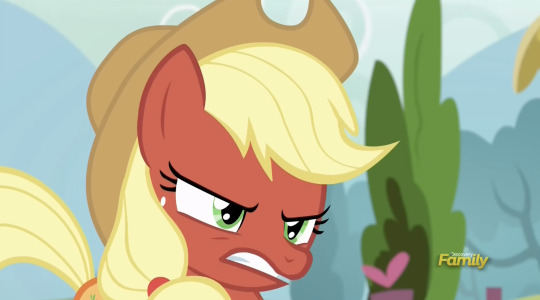
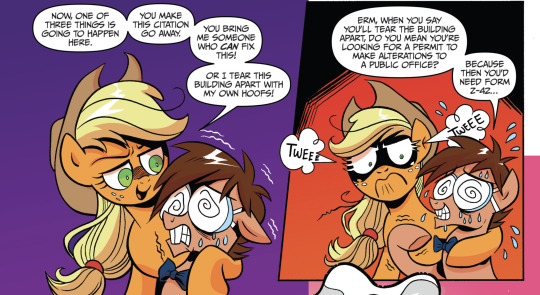
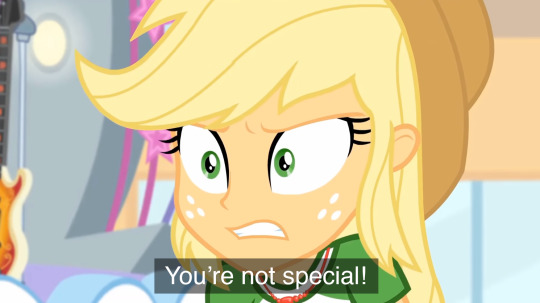
Subtextually, a lot of these flaws and anxieties can be (retroactively) linked to her parents' death, forcing her to grow up too quickly to become the adult/caregiver of the family (especially after her big brother becomes semiverbal). Notice how throughout the series, she's constantly acting as the "mom friend" of the group (despite everything, she manages to be the most emotionally mature of the bunch). Notice how AJ'll switch to a quieter, calmer tone when her friends are panicking and use soothing prompts and questions to talk them through their emotions/problems; something she'd definitely pick up while raising a child. Same with her stoicism and reluctance at crying or releasing emotions (something Pinkie explicitly points out). She also had a childhood relationship with Rara (which, if you were to give a queer reading, could easy be interpreted as her first 'aha' crush), who eventually left her life. (Interestingly enough, AJ also has an angry outburst with Rara for the same exact reasons as with EQG Rarity; jealous, upset that someone else is using and changing her). It's not hard to imagine an AJ with separation anxiety stemming from her mother and childhood friend/crush leaving. I'm also not above reading into AJ's relationship with her little sister (Y'all ever think about how AB never got to know her parents, even though she shares her father's colors and her mother's curly hair?).
AJ's stubbornness is a symptom of growing up too quickly as well. Who else to play with your baby sister when your brother goes nonverbal (not to discount Big Mac's role in raising AB)? Who else to wake up in the middle of the night to care for your crying baby sister when your grandma needs her rest? When you need to be 100% all the time for your family, you tend to become hard-stuck with a sense of moral superiority. You know what's best because you have to be your best because if you're aren't your best, then everything'll inevitably fall apart and it'll be your fault. And if you don't know what's best –– if you've been wrong the whole time –– that means you haven't been your best, which means you've failed the people who rely on you, which means you can't fulfill your role in the family/society, which makes you worthless . We've seen time and time again how this compulsive need to be right for the sake of others becomes self-destructive (Apple Family Reunion, Sound of Silence, all competitions against RD). We've seen in The Last Roundup how, when no longer at her best, AJ would rather remove herself from her community than confront them because she no longer feels of use to them.
But I guess it is kinda weird that AJ has "masculine" traits and isn't interested in men at all. It's totally justified that an aggressively straight, misogynistic male fandom would characterize her as a "boring background character." /s
At the time of writing this, it's 4:46AM.

#mlp#yeah i wrote this last night during insomnia.#yeah i know an embarrassing amount of crap about this kids show#but whatever it's my hyperfixation i'll store as much useless information as i want!!!#i'm gay and neurodivergent i have an excuse#in case you needed more proof that aj's my favorite character#personal#delete later#unless you like this analysis stuff#i get why they didn't reveal aj's parent's death until way later and why they didn't do much with it but i wish they did#cuz narratively there could've been so much material with aj's grief. like. i feel like we gloss over the fact that she lost her#mother and father as a teenager#i tried keeping my personal hcs out of this to keep it unbiased#but i'll put some in the tags#involving rarijack –– i think aj can be (but not always) very self-conscious about her relationship with rarity#anxieties that she's not the right fit or that rarity will move away and leave her some day or that another woman will take her attention#(like in rollercoaster of friendship?? nudge nudge??). basic seperation anxiety stuff#long post#regarding applebloom whenever i think about her and her parents i think about that scene in steven universe where steven looks up at#a portrait of his mother and openly wonders what kind of sack lunches she would've made for him. that episode still fucks me up
4K notes
·
View notes
Text
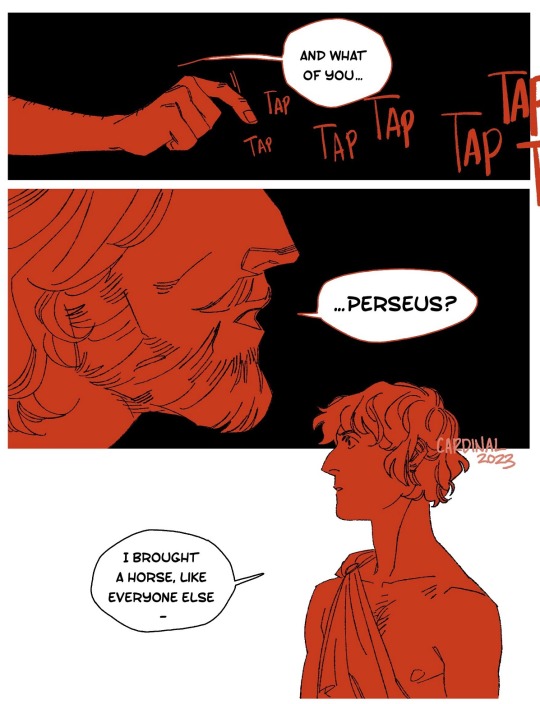
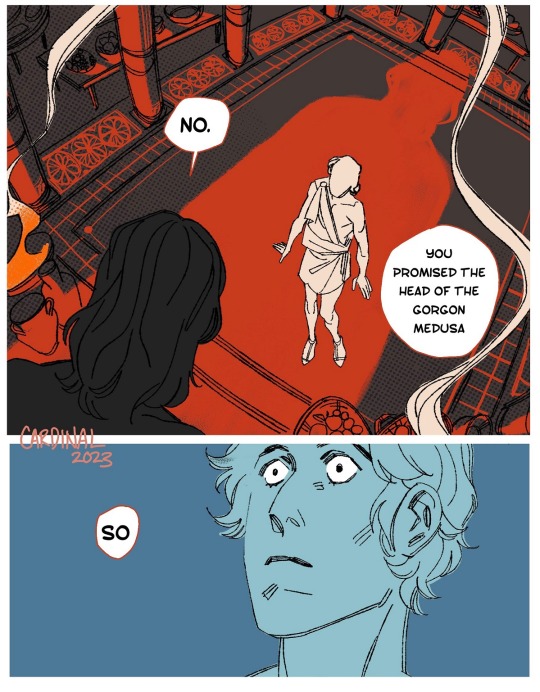
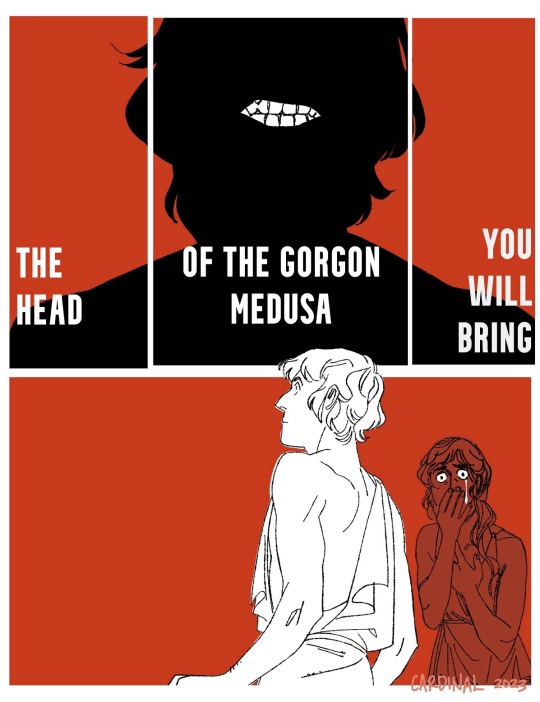
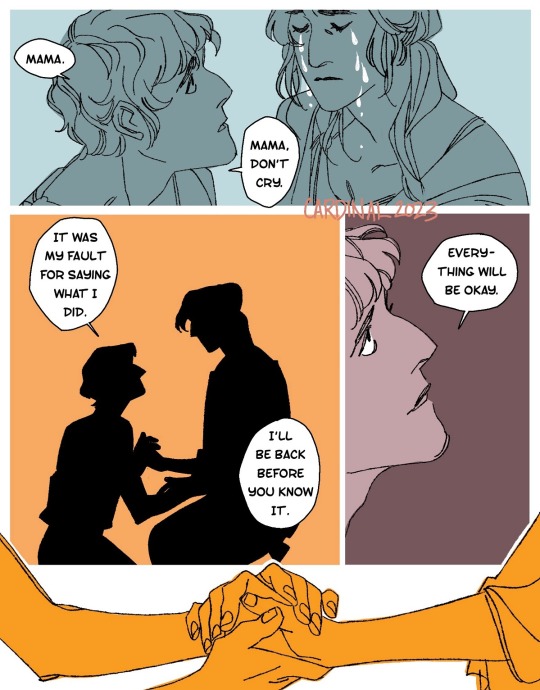
something. about. the horror of being sent on an impossible (death) quest and obligations and hospitality politics. the trauma of not having a home, and then the trauma of being in a house that becomes actively hostile to you, one that would swallow you whole and spit out your bones if you step out of line. all of this is conditional, your existence continues to be something men want gone.
it's about going back as far as I can with the perseus narrative because there's always a version of a myth that exists behind the one that survives. the missing pieces are clearly defined, but the oldest recorded version of it isn't there! and there's probably something older before that!! but it's doomed to forever be an unfilled space, clearly defined by an outline of something that was there and continues to be there in it's absence.
and love. it's also about love. even when you had nothing, you had love.
on the opposite side of the spectrum, this is Not About Ovid Or Roman-Renaissance Reception, Depictions And Discourses On The Perseus Narrative.
edit: to add to the above, while it's not about Ovid, because I'm specifically trying to peel things back to the oldest version of this story, Ovid is fine. alterations on the Perseus myth that give more attention Medusa predate Ovid by several centuries. this comic is also not about those, either! there are many versions of this story from the ancient world. there is not one singular True or Better version, they're all saying something.

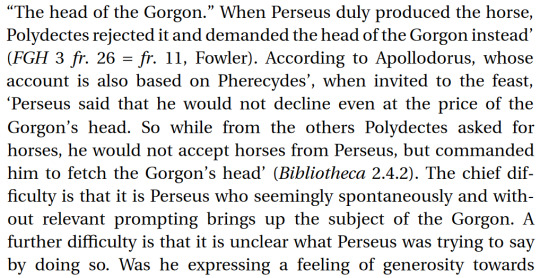
Perseus, Daniel Ogden

Anthology of Classical Myth: Primary Sources in Translation, edited & translated by Stephen M Trzaskoma, R. Scott Smith, Stephen Brunet
#perseus#danae#komiks tag#long post#every other week i start to say something about how greek heroes are a good case study in diaspora and exile trauma#but man perseus makes me so sad. so does danae. she loves her son :(#perseus turning a whole island to stone is a huge mood. i would also do that if i were him#anyway (salutes) take care everyone i gotta watch yunho's new video it looks like a fucking movie im so excited#(i singled out ovid bc i remember the fucking shit perseus discourse that ran through this site. i remember#im preemptively loading a gun and pointing at it before it can touch this post#it hasn't died out either i see it on twitter all the time in the most ANNOYING ways possible i am TIRED#esp bc they're actually doing medusa a narrative disservice like congrats! you made it worse! stop telling me it's better!!!!)#it’s all greek to me
7K notes
·
View notes